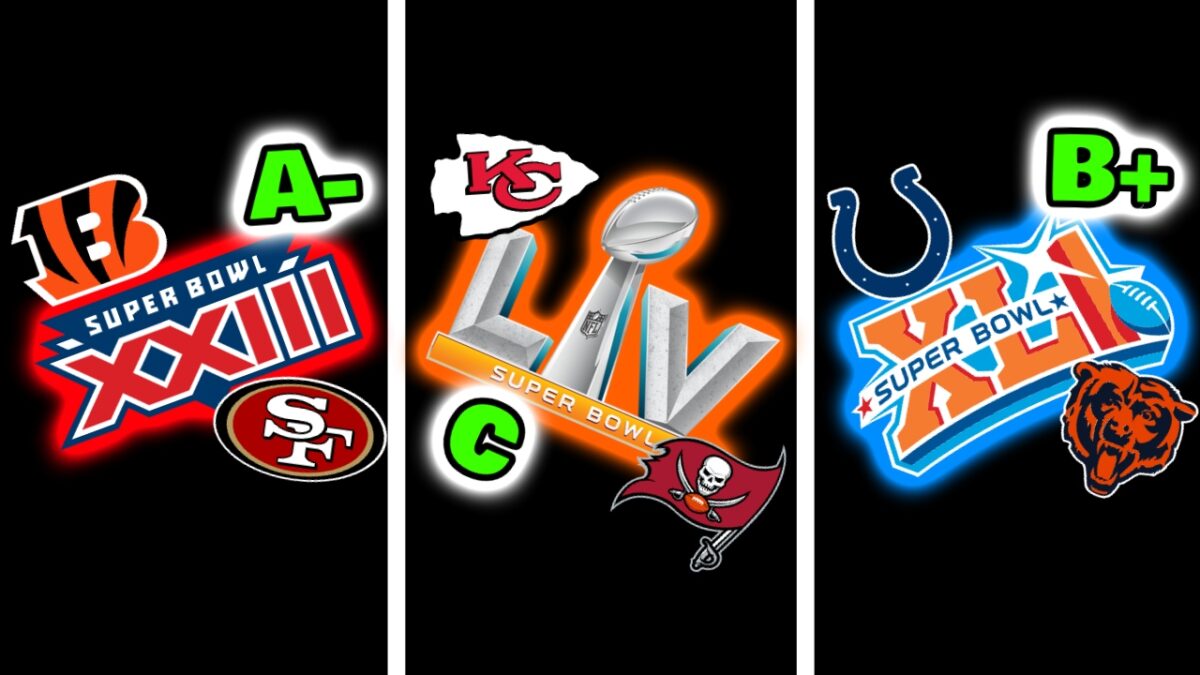
Over the years, NFL fans saw some incredible Super Bowls being played where both teams played a neck-and-neck contest as one team emerged victorious. Some games are remembered as instant classics, and we wished they might continue on beyond the four quarters. Other Super Bowls were disappointments, either because the offense of the losing team couldn’t get it going or neither team’s defenses had their heart in the game.
From heart pounding spectacle too heart wrenching defeats, here are the grades of all 58 Super Bowls:
Super Bowl I: C+
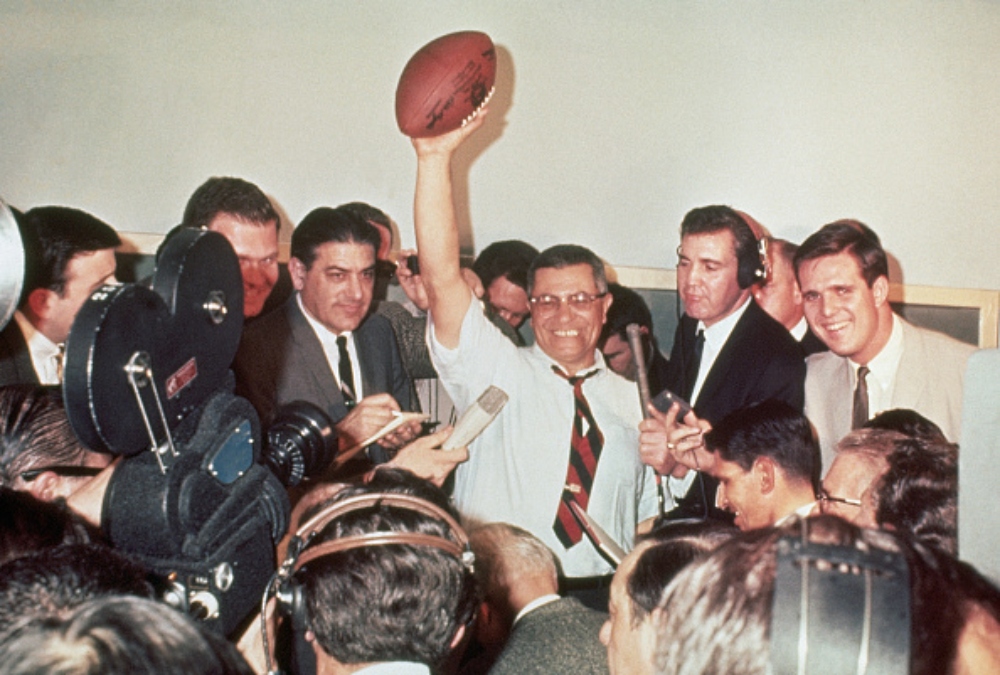
The first Super Bowl saw the iconic Vince Lombardi’s Green Bay Packers defeat the Kansas City Chiefs, 35-10. Bart Starr played an incredible game with two touchdowns against one interception against Hank Stram’s Chiefs. Len Dawson played fair as he threw a touchdown against an interception in the contest. As good as Stram’s Chiefs were in the first half, the Packers shut the Chiefs out in the second half of the game, and ran all over them, to win it all and become the very first Super Bowl champions.
Super Bowl II: B
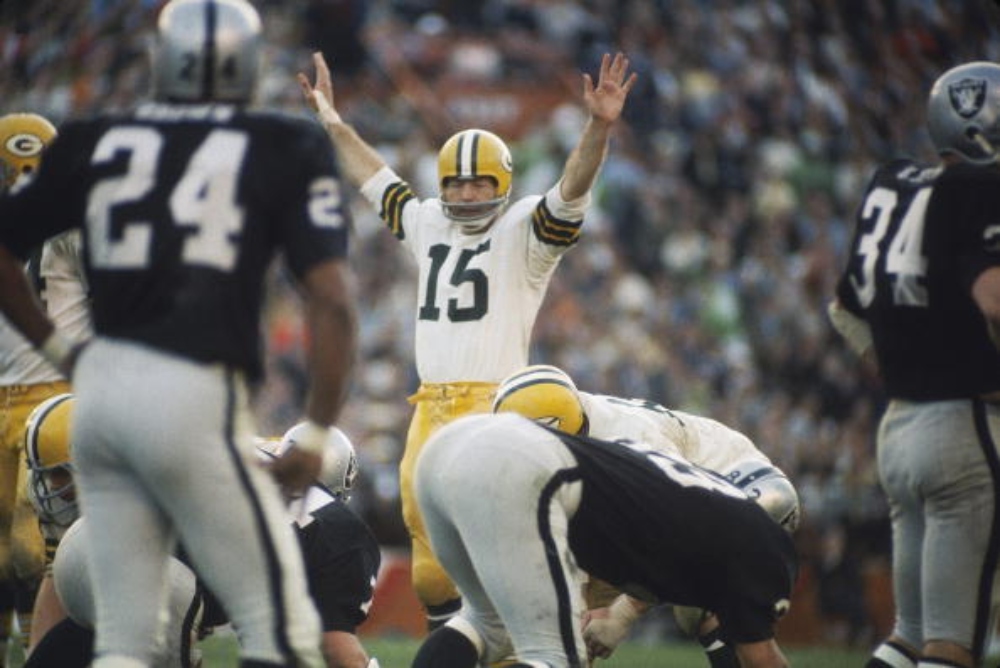
Lombardi’s Packers returned to the big dance and defeated the AFL’s Oakland Raiders, 33-14. Bart Starr threw a touchdown to Donny Anderson against no interceptions and had a QBR of 96.2. The Packers’ defense kept the Raiders out of the end-zone in the first and third quarters of the game. The Packers came out on top, completed their 1960s dynasty, and showed the world why the NFL was superior to their AFL counterpart.
Super Bowl III: B+
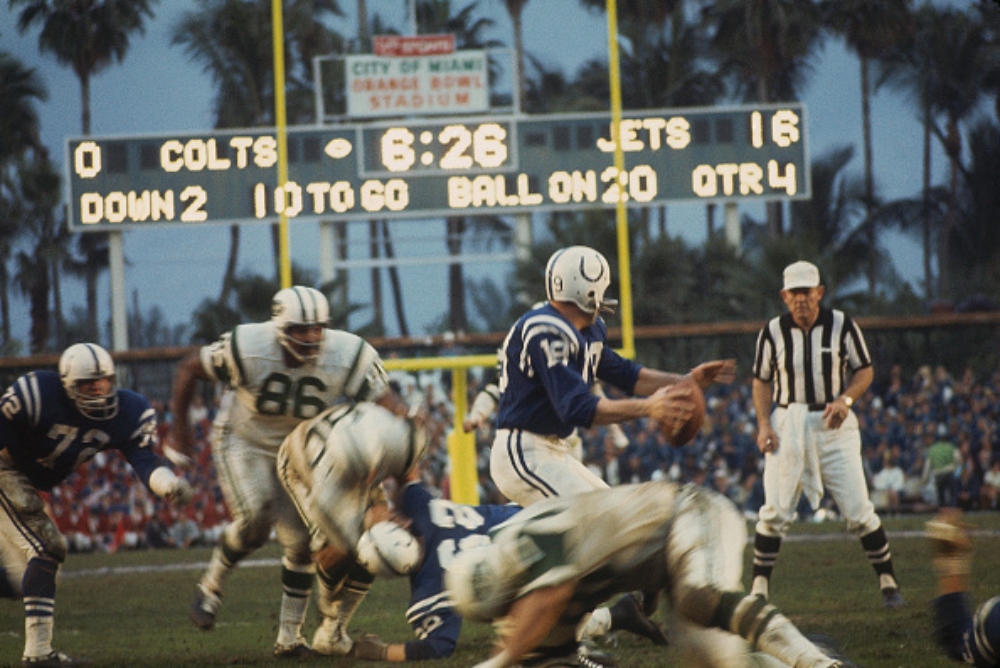
Click on ‘Follow Us’ and get notified of the most viral NFL stories via Google! Follow Us
Arguably one of the best Super Bowls of all time, the AFL’s New York Jets entered the game as 19.5-point underdogs. Joe Namath guaranteed the Jets would win it before the game. Broadway Joe’s words of encouragement became a reality as the Jets defeated the Baltimore Colts 16-7. Johnny Unitas had a rough game, as he threw an interception while Joe Namath didn’t throw any touchdowns, but was named Super Bowl MVP. The Jets’ victory was also icing on the cake for head coach Weeb Ewbank, who coached the Colts from 1954 until he was fired in 1962 and won two NFL Championships with the club before taking the Jets job in 1963.
Super Bowl IV: C+
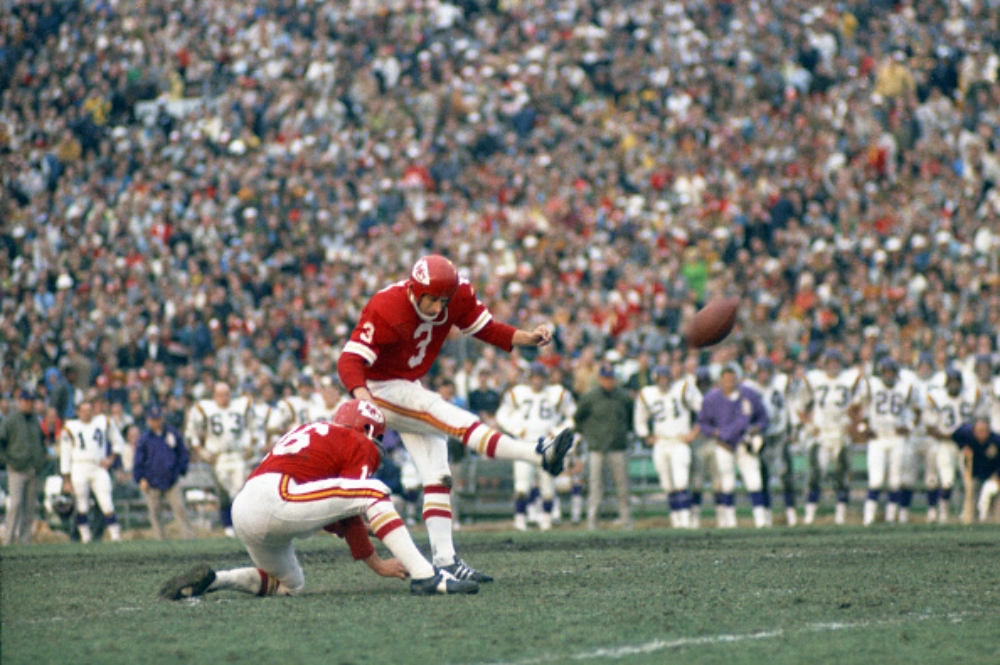
After losing the inaugural Super Bowl, Hank Stram’s Chiefs returned to the big dance and won it all, 23-7 against the Minnesota Vikings. Chiefs’ quarterback Len Dawson played a fair game as he threw a touchdown to Mike Garrett against an interception. Vikings’ quarterback Joe Kapp threw two costly interceptions in the game. The Chiefs’ defense also kept the Vikings out of the end-zone for three quarters, except for the third quarter, when Dave Osborn scored the Vikings’ only touchdown of the game. This would be the Chiefs’ only Super Bowl victory until they won it all 50 years later.
Super Bowl V: C+
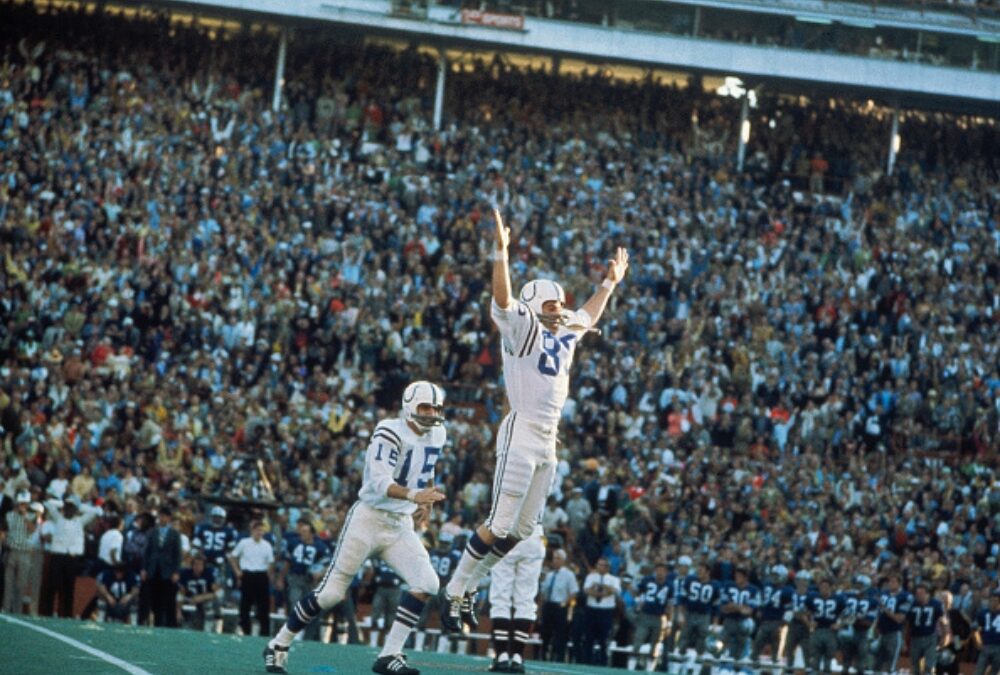
In a very neck-and-neck contest, Super Bowl V saw the Baltimore Colts led by backup quarterback Earl Morrall help the team win, 16-13 against Tom Landry and the Dallas Cowboys. Johnny Unitas did play in the game and threw a touchdown to John Mackey against two interceptions. Unitas left the game with a broken foot. Cowboys quarterback Craig Morton threw a touchdown against three interceptions in the game. The Cowboys came up short in a very blooper-filled game, with both teams not playing at their highest levels, at the time.
Super Bowl VI: C+
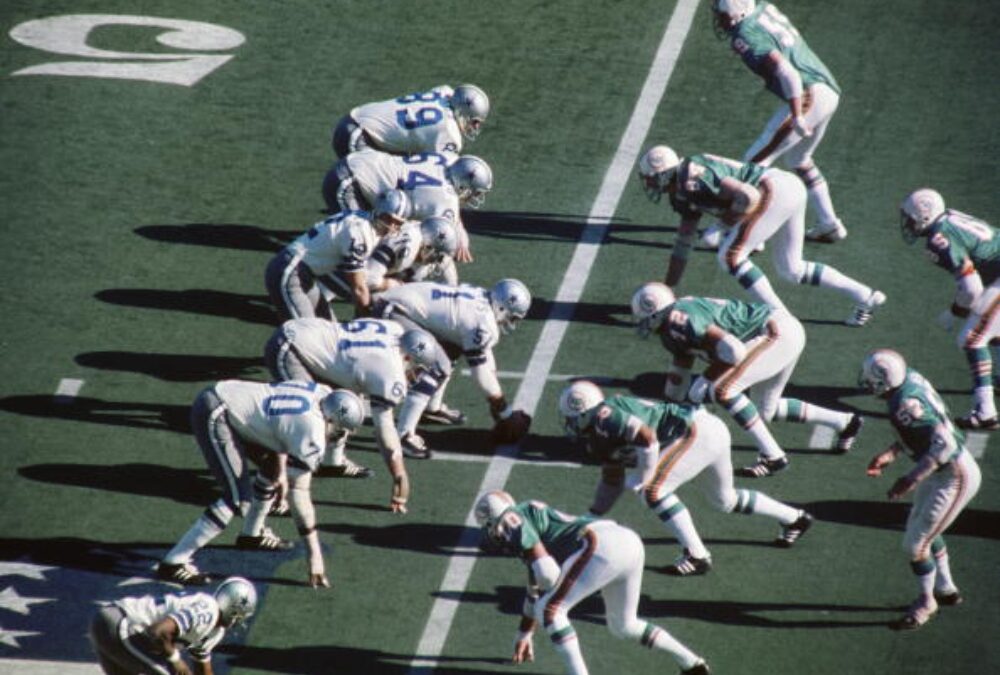
After losing Super Bowl V a season ago, Tom Landry’s Dallas Cowboys returned to the big dance and won it all, 24-3 against Don Shula’s Miami Dolphins. Roger Staubach played immaculately well with two touchdowns against no interceptions. The same thing couldn’t be said about Bob Griese, who threw a costly interception that set Mike Ditka up to score the game-winning touchdown to end the Dolphins’ misery. Overall, it was a strong statement win for the Cowboys who showed the world why they’re nicknamed “America’s Team”!
Super Bowl VII: B
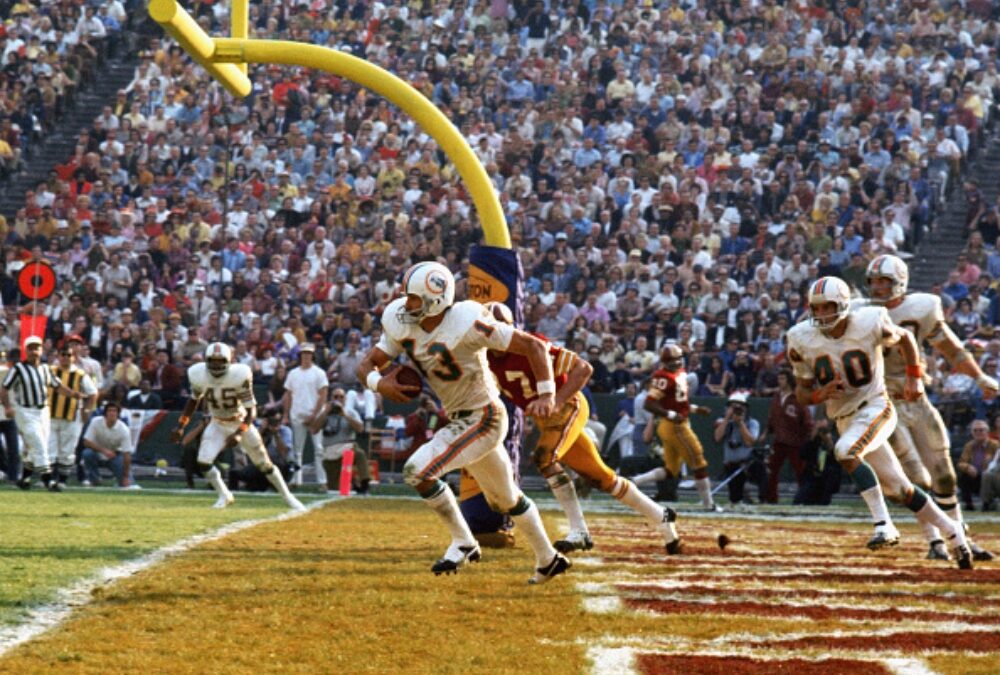
Don Shula’s Dolphins returned to the big dance after getting crushed by Tom Landry’s Cowboys and defeated Washington, 14-7 to not only win the Super Bowl, but they did it in undefeated fashion. Bob Griese threw a touchdown and one interception while Washington’s Billy Kilmer threw three interceptions. The game is also remembered for Garo Yepremian’s blocked field goal that was returned for a touchdown by Washington’s Mike Bass with two minutes and seven seconds left in the game. Miami stayed cool and held on to win, becoming the only undefeated team to win the Super Bowl.
Super Bowl VIII: C
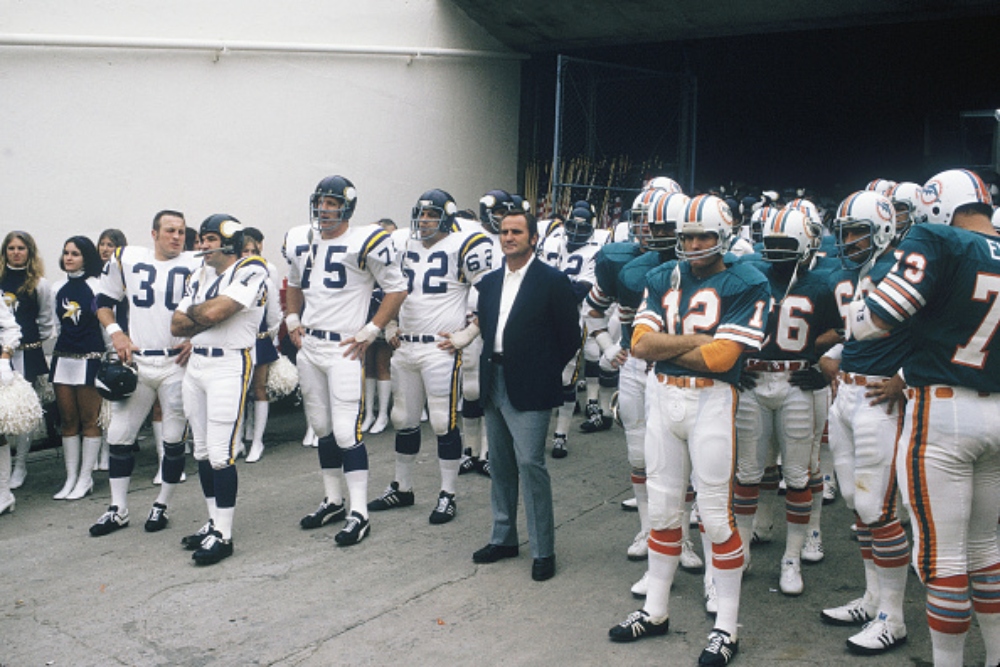
Even though the 1973 Miami Dolphins weren’t undefeated like they were the previous year, they still dominated the Minnesota Vikings in Super Bowl VIII with a final score of 24-7. Bob Griese didn’t throw any touchdowns or interceptions, but Larry Csonka and Jim Kiick scored rushing touchdowns for the Dolphins. Fran Tarkenton threw an interception and scored a rushing touchdown in the fourth quarter. The game belonged to Miami, as they secured their second Super Bowl title with ease.
Super Bowl IX: B-
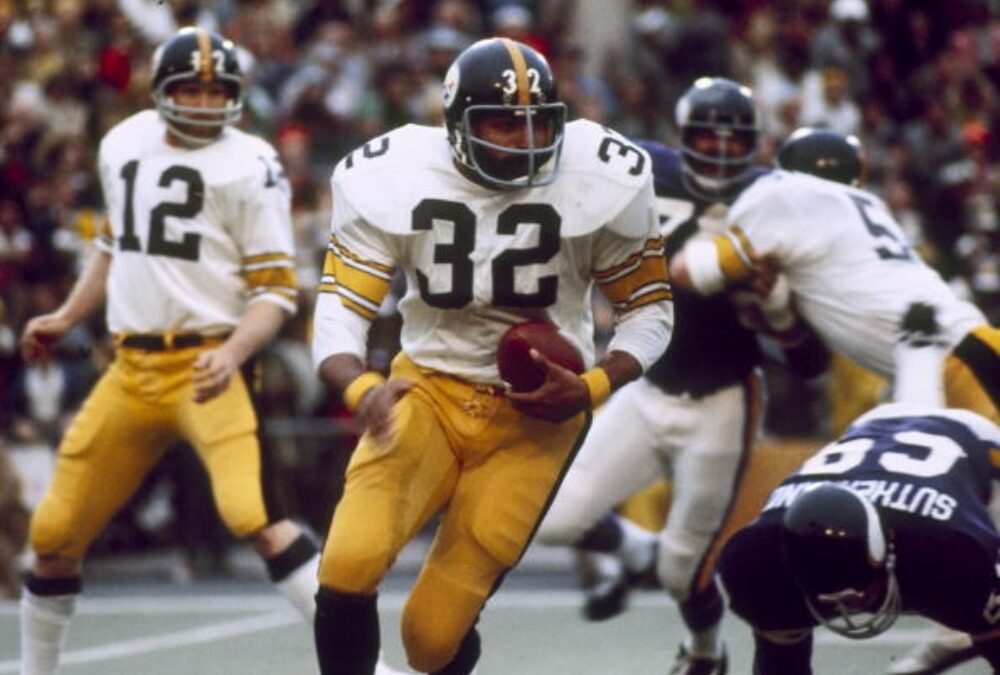
What originally started as a scoreless game in the first quarter, Chuck Noll’s Steelers went to work and scored a safety in the second quarter, and two touchdowns in the second half as they went on to win their team’s first Super Bowl, 16-6 against the Minnesota Vikings. Terry Bradshaw threw a touchdown against no interceptions while Fran Tarkenton threw three costly interceptions in the game. The Steelers’ “Steel Curtain” defense made things very difficult for the Vikings to overcome, as “Mean” Joe Greene, Mel Blount, and Mike Wagner all had interceptions. This game marked the beginning of the Steelers dynasty of the 1970s.
Super Bowl X: B
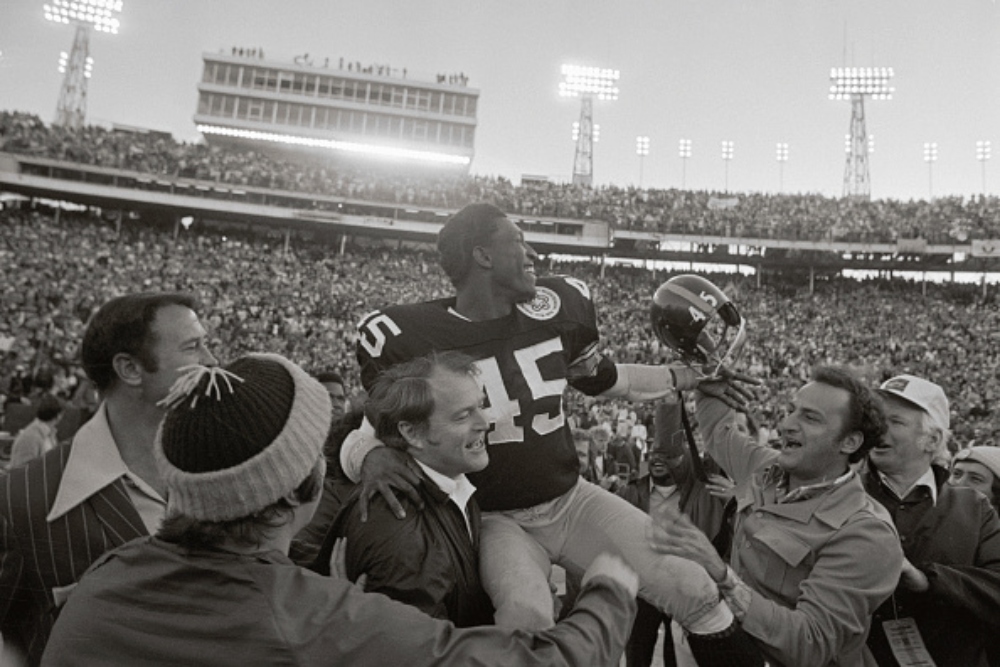
The game started slowly, as Tom Landry’s Dallas Cowboys led the Steelers, 10-7 at halftime. Then the fourth quarter came, and the Steelers clawed their way back and won 21-17. Roger Staubach threw two touchdowns and three costly interceptions while Terry Bradshaw threw two touchdowns against no interceptions. One of Bradshaw’s throws was to Lynn Swann for a 64-yard touchdown which is nicknamed “The Greatest Throw of All Time”. Glenn Edwards of the Steelers stopped a Cowboys comeback, sealing the deal for Super Bowl number two for the Steel City.
Super Bowl XI: B+
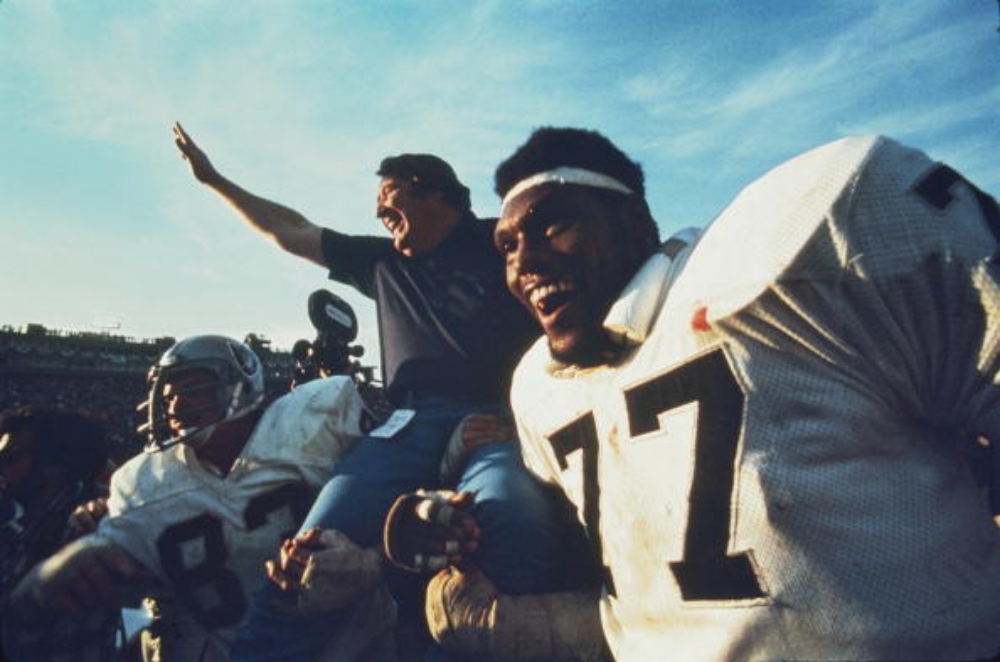
After losing in Super Bowl II, the Oakland Raiders returned to the big dance and won, 32-14 in dominating fashion against the Minnesota “Vikings Purple People Eater” defense. Ken Stabler threw a touchdown to Dave Casper against no interceptions, while Fran Tarkenton threw a touchdown against two interceptions. The Raiders’ defense forced a sack and Willie Brown had an interception returned for a 75-yard pick-six touchdown. The game is also notable, as it was John Madden’s only Super Bowl win as a head coach.
Super Bowl XII: B-
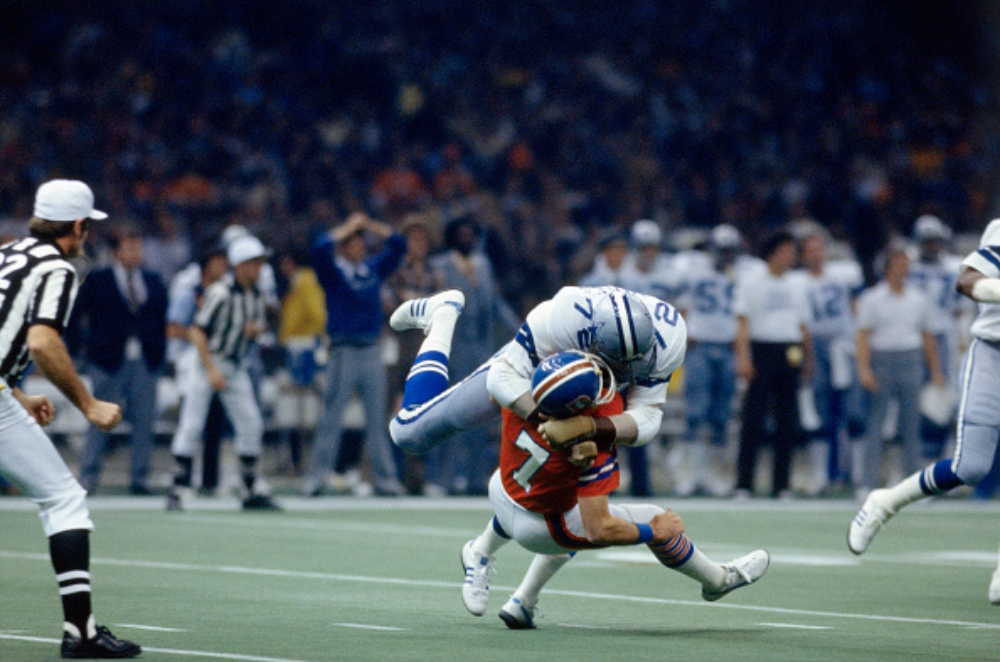
Tom Landry’s Cowboys returned to being kings of the NFL, as they defeated their former quarterback, Craig Morton, and the Denver Broncos 27-10. Roger Staubach threw one touchdown against no interceptions but was sacked five times by the Broncos’ “Orange Crush” defense”. Morton threw four interceptions against the Cowboys’ “Doomsday Defense” and was sacked four times. With the victory, Landry and the ‘Boys continued to solidify the Cowboys as “America’s Team.”
Super Bowl XIII: A-
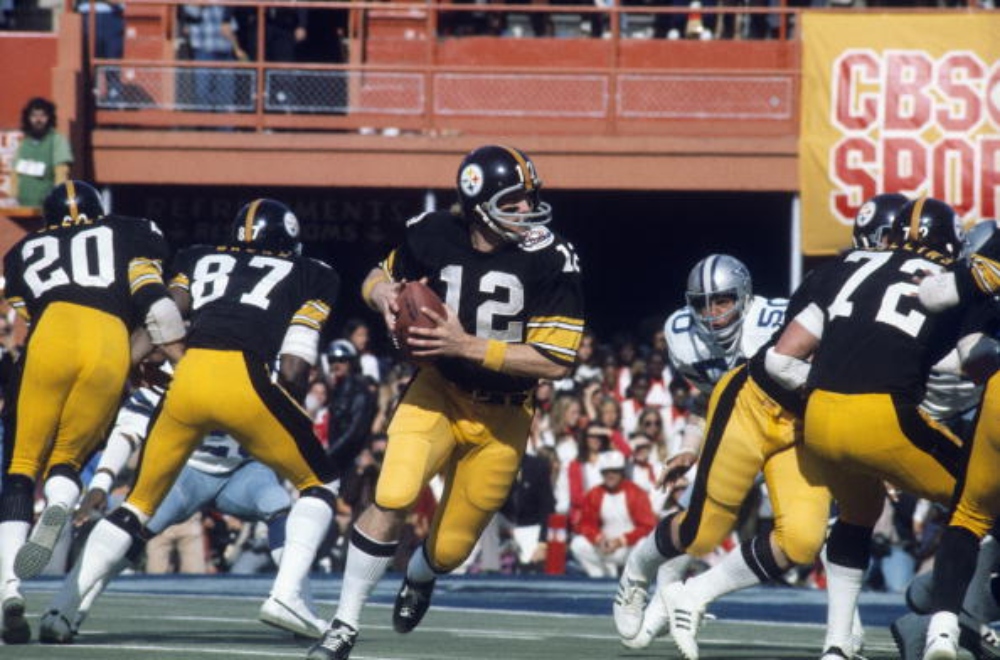
Arguably one of the greatest Super Bowls ever played, the Pittsburgh Steelers and the Dallas Cowboys played a very competitive neck-and-neck battle, which resulted in the Steelers winning 35-31. Terry Bradshaw threw four touchdowns against one interception while Roger Staubach threw three touchdowns against one interception. This game is also notable, as Staubach threw a costly incompletion intended for tight end, Jackie Smith, with two minutes and 46 seconds left in the third quarter. This Super Bowl solidified the Steelers’ dynasty of the 1970s and why they were the best team of the decade.
Super Bowl XIV: B+
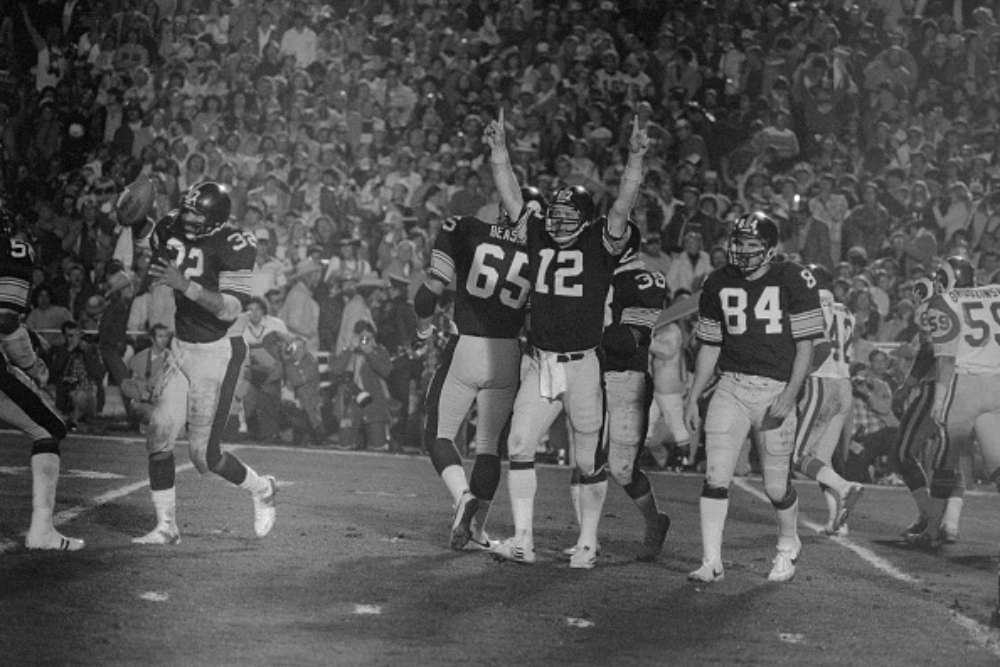
Despite the Steelers winning, 31-19 against the Los Angeles Rams, in the Rose Bowl, Super Bowl XIV saw seven lead changes, as audiences saw quite a show from the intensity of both teams. Terry Bradshaw threw two touchdowns against three interceptions while Vince Ferragamo threw a touchdown against four interceptions. As good as the Rams were, they were no match for the “Steel Curtain” defense as they shut the Rams out in the fourth quarter. This would be the Steelers’ last Super Bowl win until Super Bowl XL 26 years later.
Super Bowl XV: B-
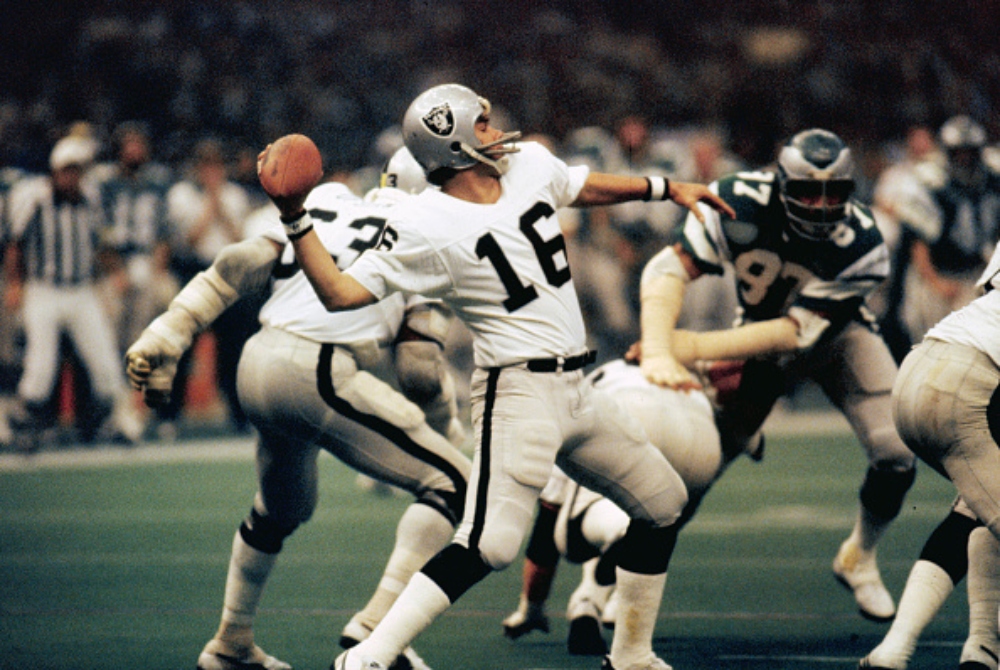
The Oakland Raiders, now led by Tom Flores, returned to the big dance and dominated Dick Vermeil’s Philadelphia Eagles 27-10. Jim Plunkett threw three touchdowns against no interceptions, while Ron Jaworski threw a touchdown to Ken Krepfle against three interceptions (all three were picked off by Rod Martin of the Raiders). The “Silver and Black” played relentlessly, and showed no mercy to the Eagles, for a dominating Super Bowl win.
Super Bowl XVI: B+
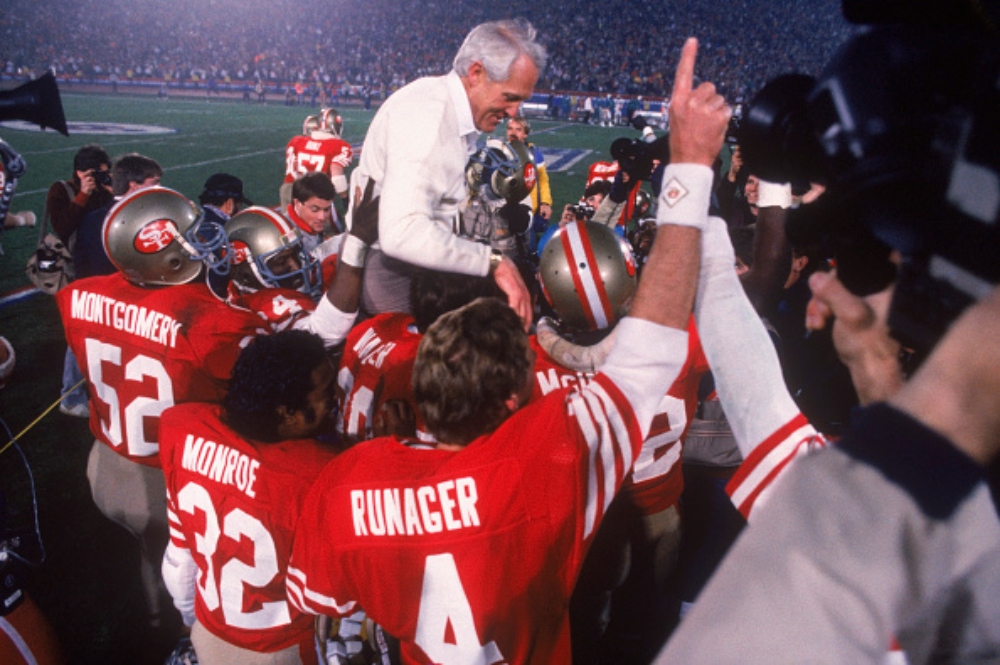
This Super Bowl marked the start of the 49ers dynasty with a 26-21 victory over the Cincinnati Bengals. Bill Walsh’s West Coast offense led by Joe “Cool” Montana started the game strong with a 20-0 halftime lead. The Bengals led by Ken Anderson tried to come back in the second half, as he threw two touchdowns to Dan Ross and scored a rushing touchdown. Ray Wersching kicked two crucial field goals in the fourth quarter, while the Bengals failed to recover their on-side kick, giving the Super Bowl to the 49ers.
Super Bowl XVII: B
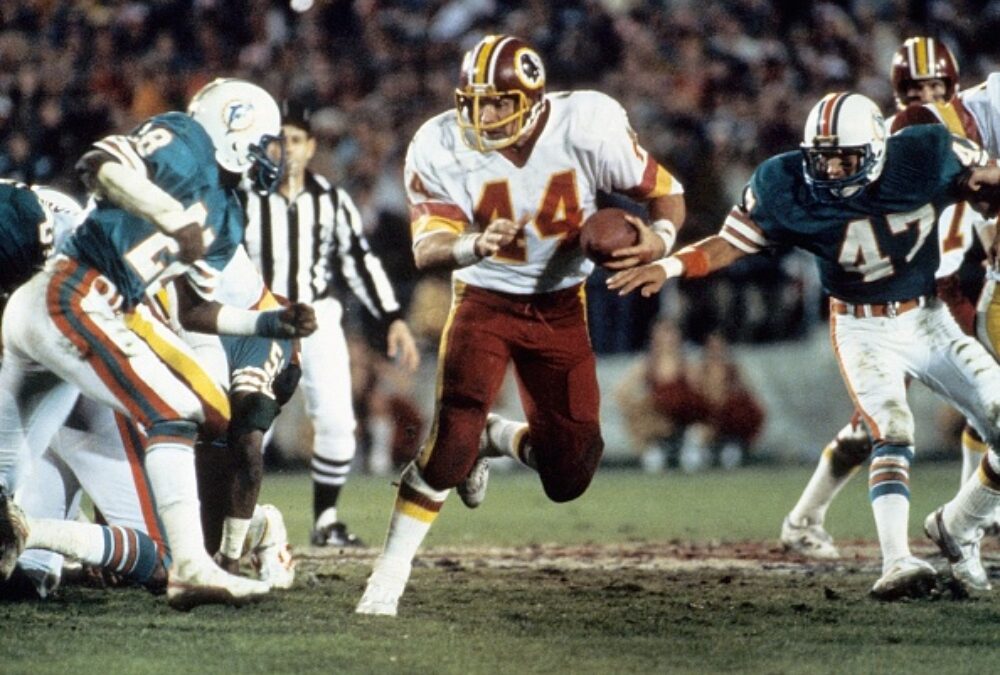
Washington’s reign of glory began when Joe Gibbs led his Washington team to a 27-17 victory over Don Shula’s Miami Dolphins. The Dolphins had a 17-10 halftime lead that evaporated in the second half as Washington kept Miami out of the end-zone. John Riggins broke through the Dolphins’ defense in the fourth quarter and bulldozed his way into the end-zone while Joe Theismann threw the game-winning touchdown to Charlie Brown. This game marked the start of the forgotten dynasty Washington established in the 1980s to 1990s.
Super Bowl XVIII: B-
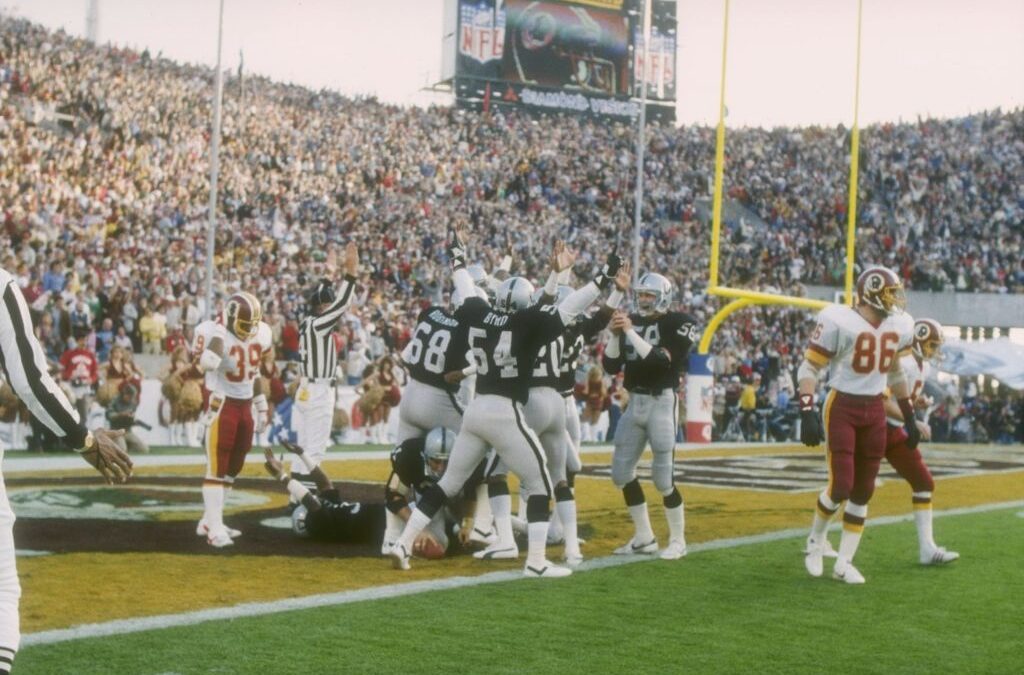
Tom Flores’ Los Angeles Raiders returned to the big dance and dominated Joe Gibbs’ Washington team 38-9 in near blowout fashion. Jim Plunkett threw a touchdown against no interceptions while Joe Theismann threw two costly interceptions and was sacked six times. The Raiders’ defense showed no mercy to Washington throughout the game as John Riggins scored the only touchdown for them. The Silver and Black truly lived by the motto “Just, Win Baby!” coined by their owner Al Davis.
Super Bowl XIX: B
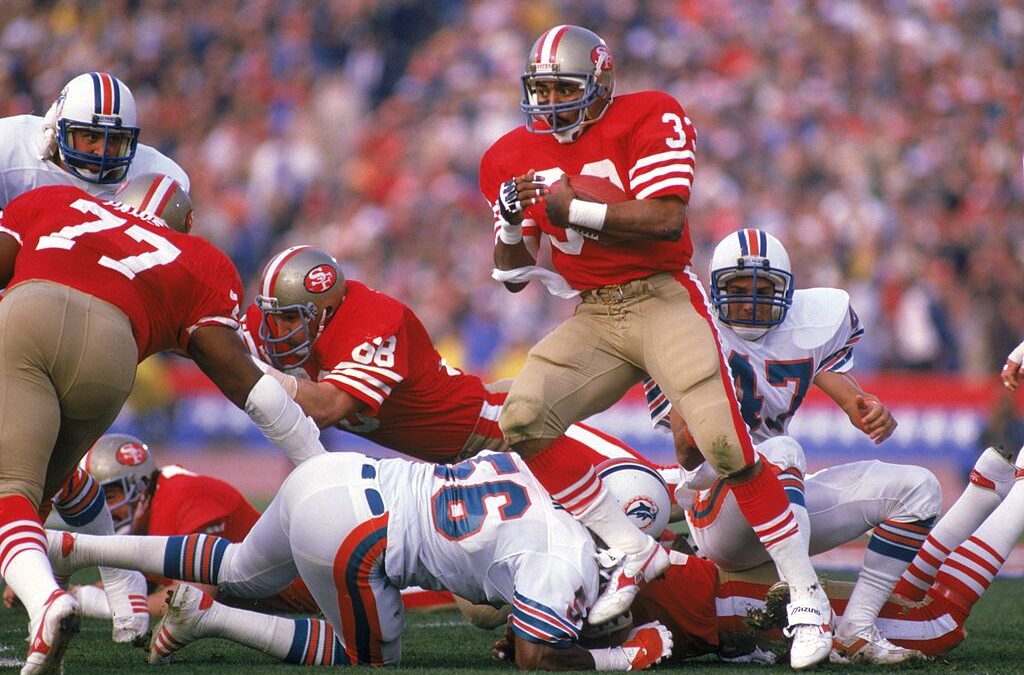
The 49ers returned to the Super Bowl and outshined Don Shula and Dan Marino’s Miami Dolphins 38-16. Joe Montana threw three touchdowns against no interceptions while Marino threw a touchdown against two interceptions. The 49ers came back to dominate after trailing 10-7 in the first quarter as they kept the gas on the pedal and never looked back. The Dolphins were kept out of the end-zone in the second half as the 49ers secured Lombardi Trophy number two.
Super Bowl XX: B
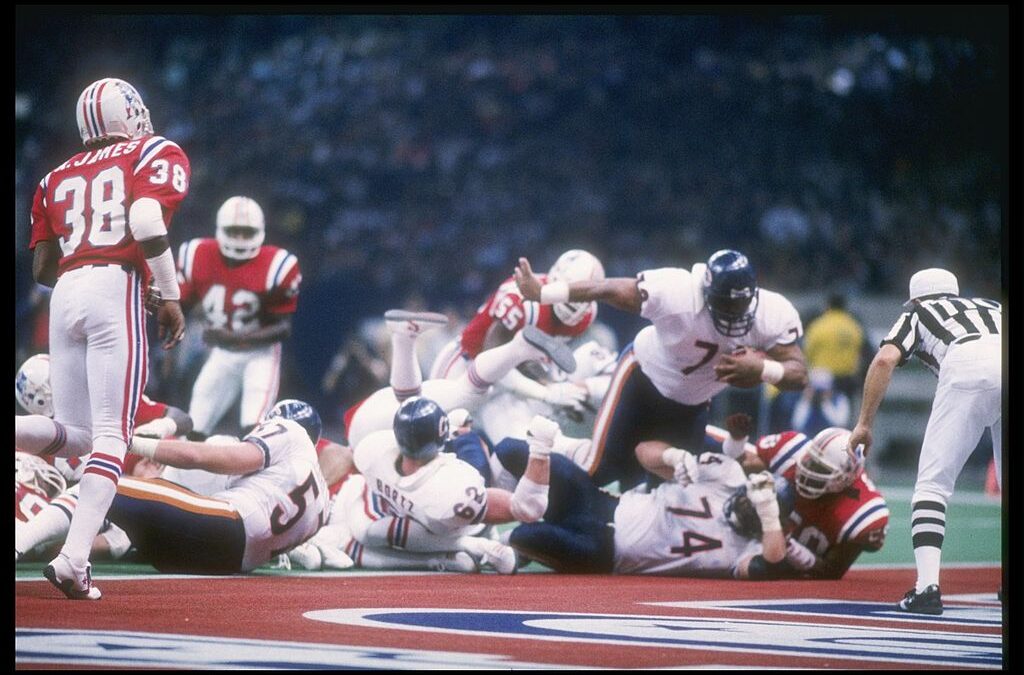
This Super Bowl is remembered for one thing, the Chicago Bears’ defense smothering the New England Patriots 46-10. Jim McMahon scored two rushing touchdowns, while Patriots quarterback Steve Grogan had a rough night, as he threw one touchdown against two interceptions and was sacked four times. Richard Dent, Dan Hampton, Steve McMichael, and Mike Singletary are four notable defensive Hall of Famers who made things incredibly difficult for the Pats all night long. This Super Bowl etched head coach Mike Ditka into Bears lore forever.
Super Bowl XXI: B
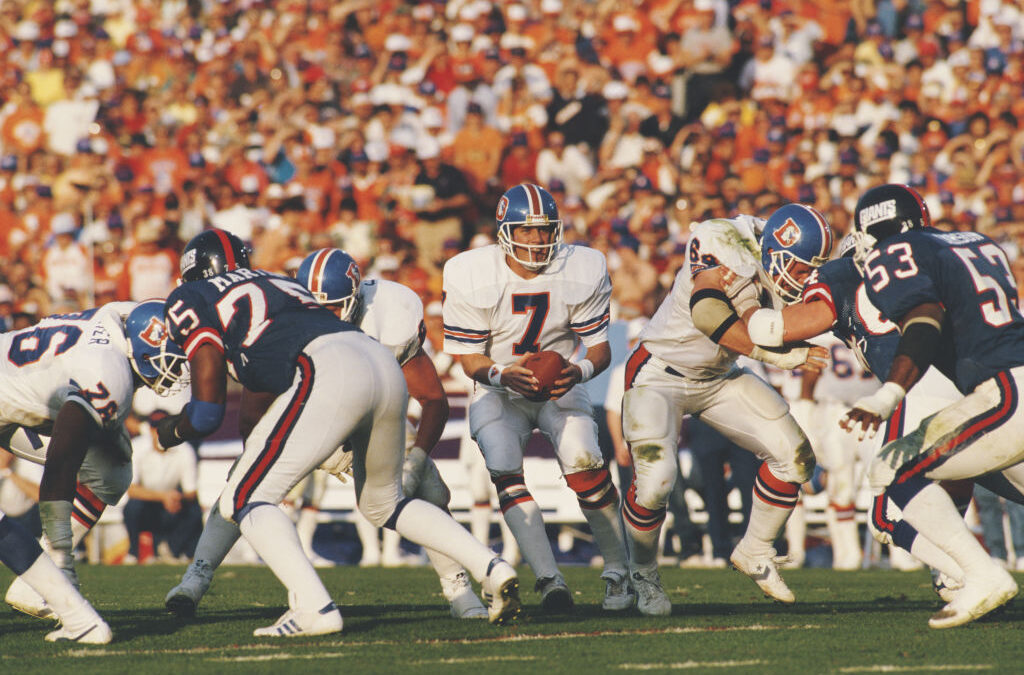
This game started tight, as John Elway and the Denver Broncos led Phil Simms, 10-7 in the first quarter. However, the lead evaporated, as the Giants stormed back in the second half and ultimately won, 39-20. Simms threw three touchdowns against no interceptions while Elway threw a touchdown against an interception. The Giants’ defense played extremely well, as they gave Elway a rough time on the field. This started Elway’s disappointing trend, of making it to the big game, only to fall short.
Super Bowl XXII: B-
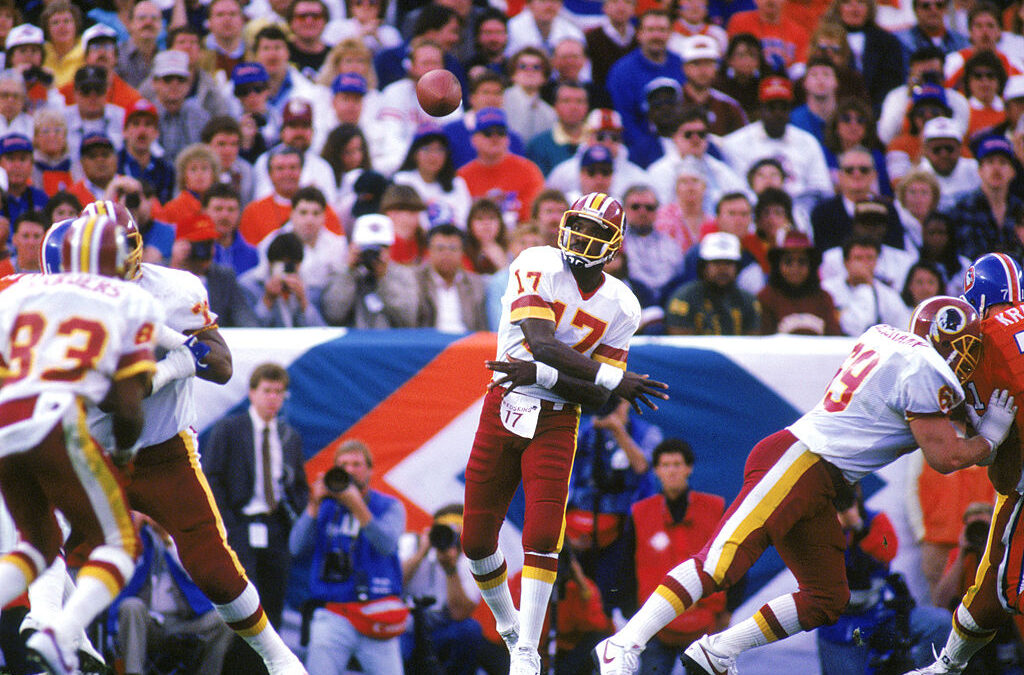
John Elway and the Denver Broncos made it back to the big dance and fell 42-10 to Doug Williams and Washington. After the Broncos had a 10-0 lead in the first quarter, Williams and Washington dropped 42 unanswered points and kept Elway out of the end-zone, for the remainder of the night. Elway threw one touchdown against three costly interceptions on the night. Williams threw four touchdowns against one sack and was named Super Bowl MVP as a result of his performance. It was a strong statement win by Washington, as they showed the league why they were considered one of the best teams in the 1980s.
Super Bowl XXIII: A-
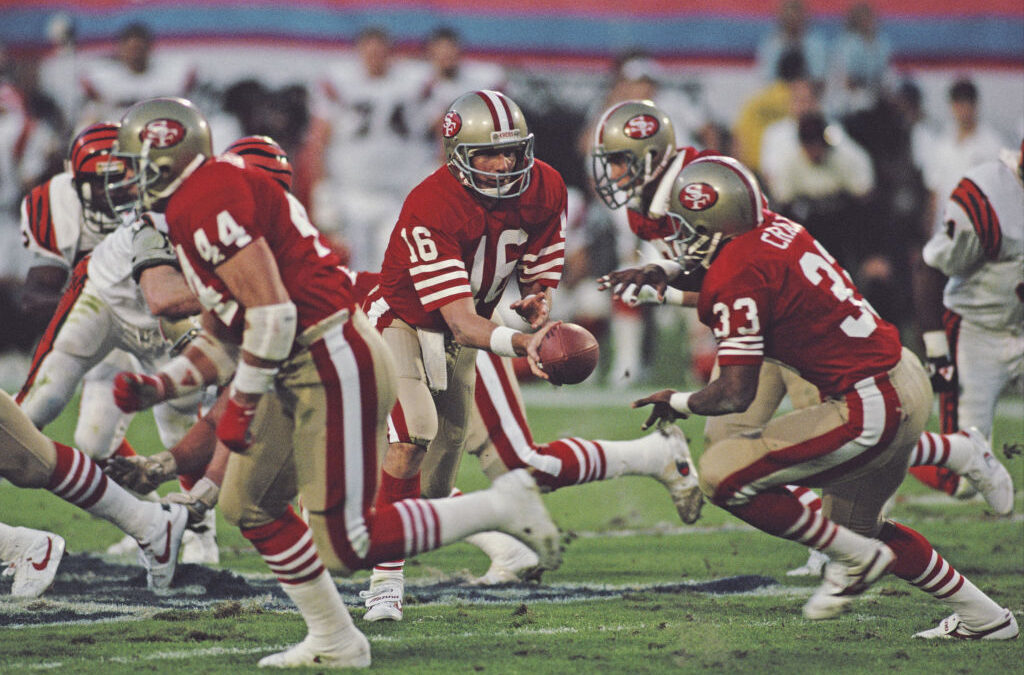
In a very close and competitive battle, between the San Francisco 49ers and Cincinnati Bengals, Joe “Cool” Montana led the game-winning drive with a 14-yard touchdown pass to Jerry Rice, giving the 49ers a 20-16 victory. Boomer Esiason threw an interception while James Brooks scored two rushing touchdowns in the contest. Montana threw two touchdowns against no interceptions, but was sacked three times. In the end, Montana and Rice got the 49ers their third Super Bowl win, creating the 49ers dynasty. This game also was Bill Walsh’s last game as the 49ers head coach, as he stepped down from his role.
Super Bowl XXIV: C+
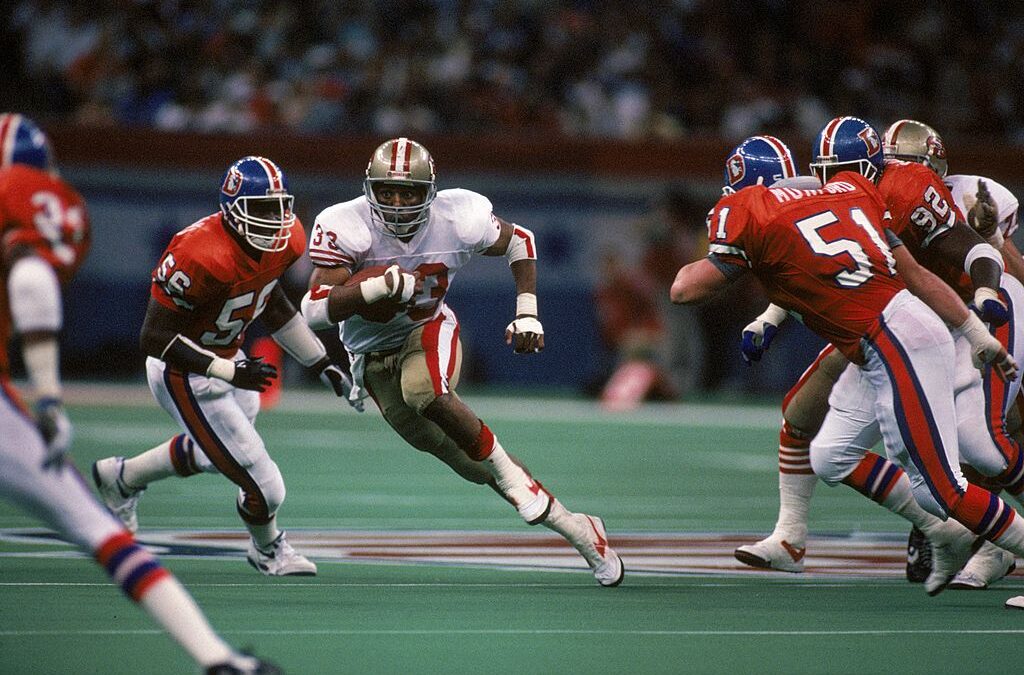
The San Francisco 49ers led by new head coach, George Seifert, outplayed and obliterated John Elway and the Denver Broncos, 55-10 in the largest point margin in Super Bowl history. Joe Montana threw five touchdowns against no interceptions and Jerry Rice caught three of those touchdowns. Elway threw four interceptions and backup quarterback, Gary Kubiak, threw two interceptions. The 49ers’ defense had themselves a night, with Chet Brooks returning an interception for 38 yards. Despite the 45-point margin, blowouts are fun for the winning fan-base but not so enjoyable for others looking to appreciate a close and competitive football game.
Super Bowl XXV: A-
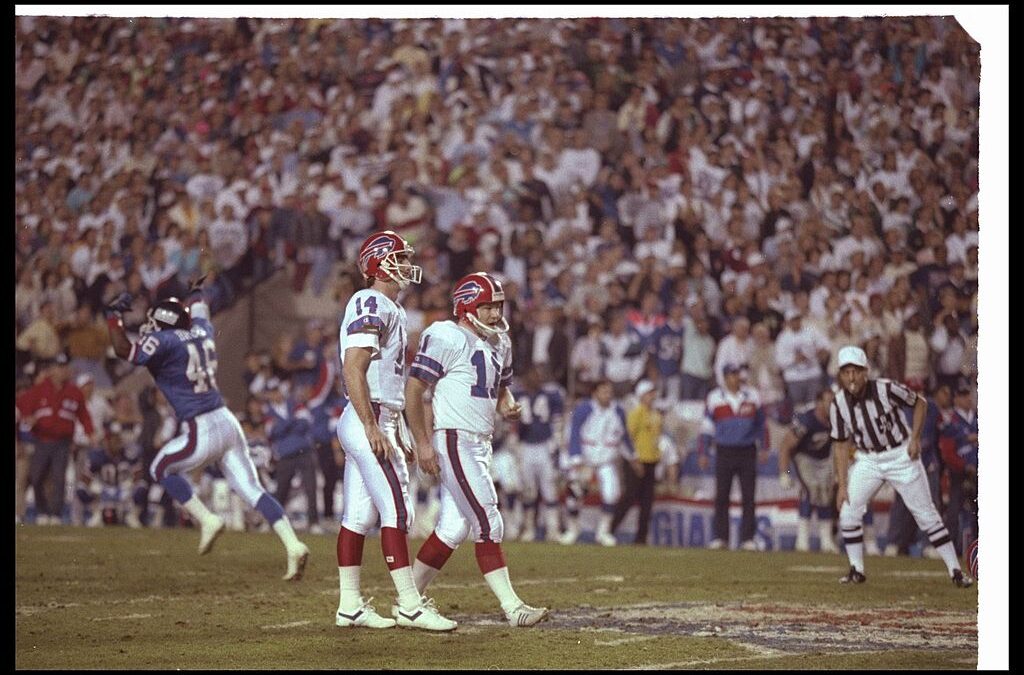
Arguably, one of the best Super Bowls of all time, the New York Giants defeated the Buffalo Bills 20-19 thanks to a Scott Norwood missed field goal. Both the Bills and Giants played a very competitive matchup, as each team scored impressive touchdowns. However, it was the Giants’ defense led by defensive coordinator, Bill Belichick that kept the Bills at bay, which led to Scott Norwood’s famous wide-right kick that gave the Giants the win. This would mark the first of four straight Super Bowls the Bills appeared in and lost.
Super Bowl XXVI: B-
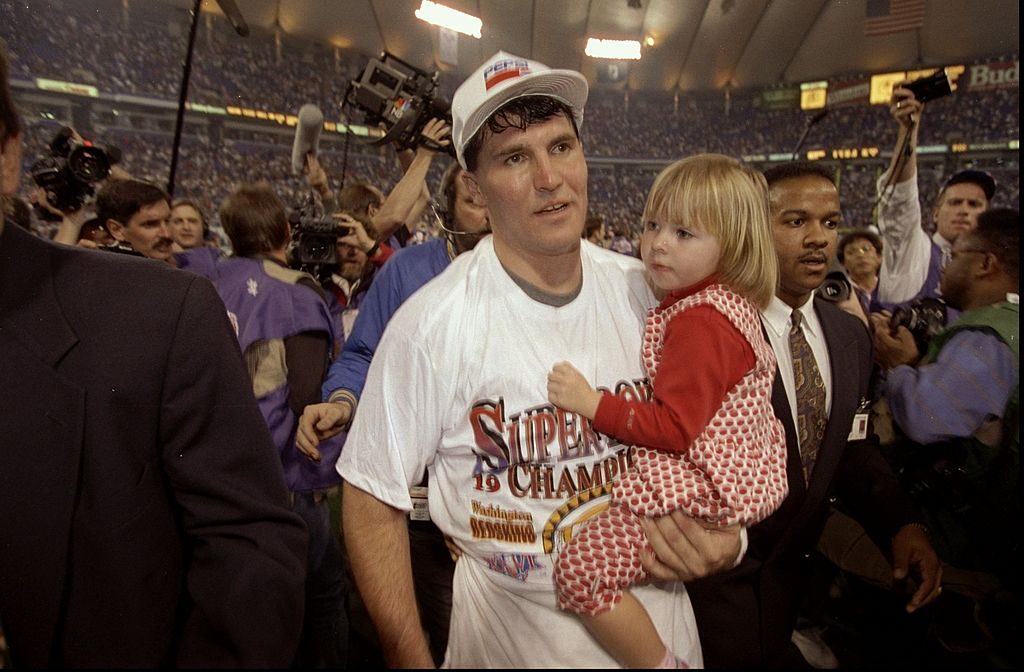
This game was an exciting night for Washington, as they secured their third Super Bowl victory, 37-24 against the Buffalo Bills, as they became the forgotten dynasty of the 1980s and early 1990s. Washington took a 17-0 halftime lead and the Bills failed to comeback from it despite a second half effort. Jim Kelly threw two touchdowns against four interceptions while Washington quarterback, Mark Rypien, threw two touchdowns against one interception. Joe Gibbs finished his first stint in Washington, as a champion of three Super Bowls, with three different quarterbacks in each.
Super Bowl XXVII: B-
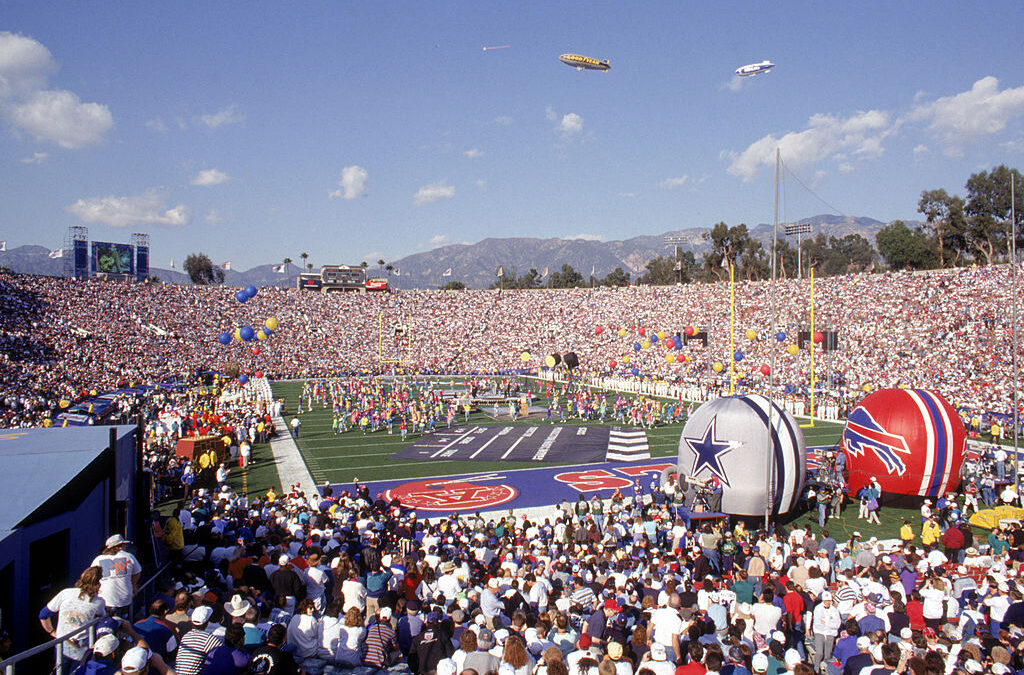
Another bad Super Bowl for the Buffalo Bills, as they met the Dallas Cowboys, coached by Jimmy Johnson, and lost the game 52-17. Troy Aikman threw four touchdowns against no interceptions. Bills backup quarterback, Frank Reich, threw a touchdown against two interceptions, and Jim Kelly threw two interceptions in the blowout loss but left the game with an injury. When the game ended, Troy Aikman was named Super Bowl MVP as the Cowboys showed the world why they were nicknamed “America’s Team” as they started their own dynasty.
Super Bowl XXVIII: B
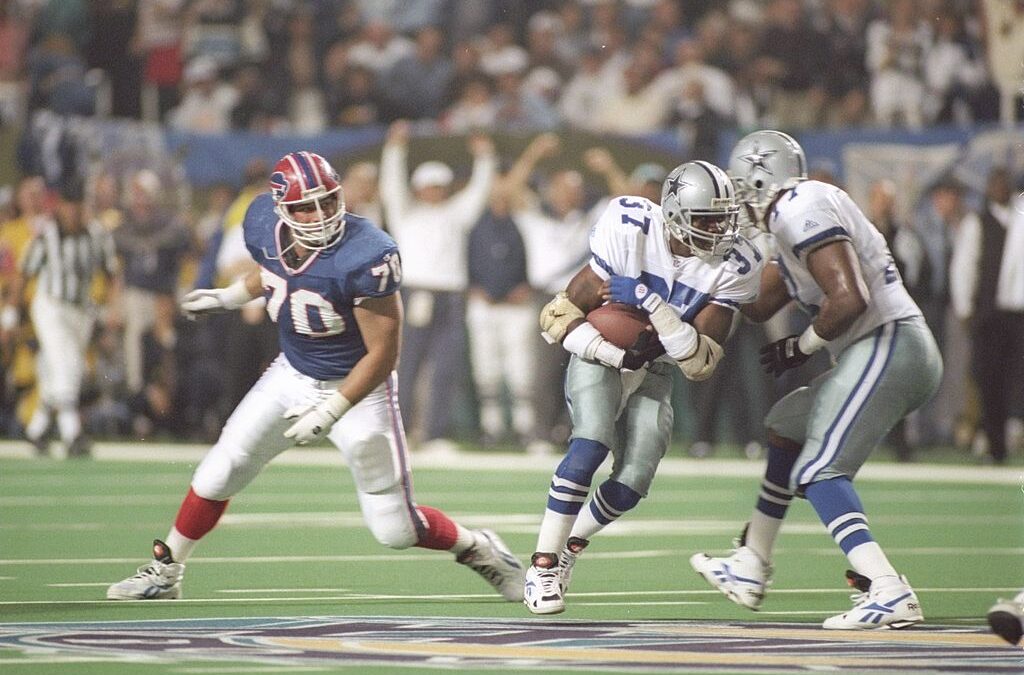
Not nearly as ugly of a score as the previous Super Bowl- both the Dallas Cowboys and Buffalo Bills met for a rematch, only for the Cowboys to come out triumphant, 30-13. Both Jim Kelly and Troy Aikman didn’t throw any touchdowns and they each threw an interception. Emmitt Smith of the Cowboys scored two touchdowns and rushed for 132 yards on the night. Smith was named Super Bowl MVP, for his performance, as the Cowboys secured another victory. James Washington of the Cowboys had a great night, as he stripped the ball from Thurmon Thomas and returned it for a 46-yard touchdown. This game also marked Jimmy Johnson’s last time coaching the Cowboys, as he left the team, due to a difficult working relationship with owner, Jerry Jones.
Super Bowl XXIX: B-
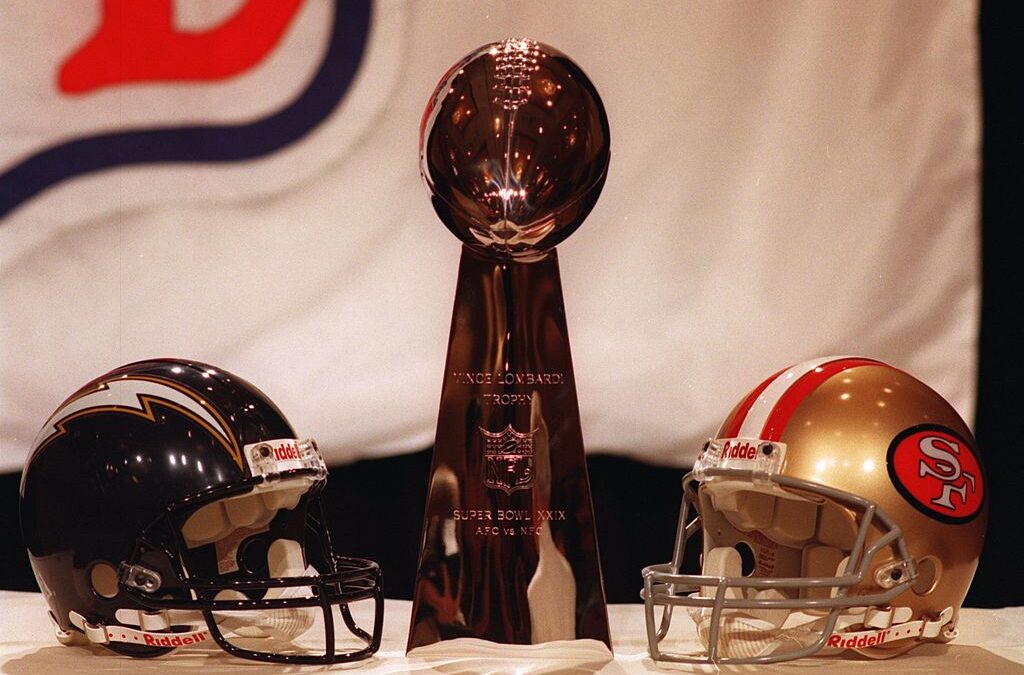
The San Francisco 49ers returned to the big dance with Steve Young leading the helm, as Joe Montana became a Kansas City Chief a couple seasons earlier, and led the 49ers to a, 49-26 victory, over the San Diego Chargers. Young threw six touchdowns against zero interceptions and Jerry Rice caught three of those touchdowns. Stan Humpheries of the Chargers, threw one touchdown against two interceptions, as the 49ers’ defense was too much for him. Deion “Primetime” Sanders had an interception returned for 15 yards as the 49ers added some more hardware to their trophy room in the end.
Super Bowl XXX: B
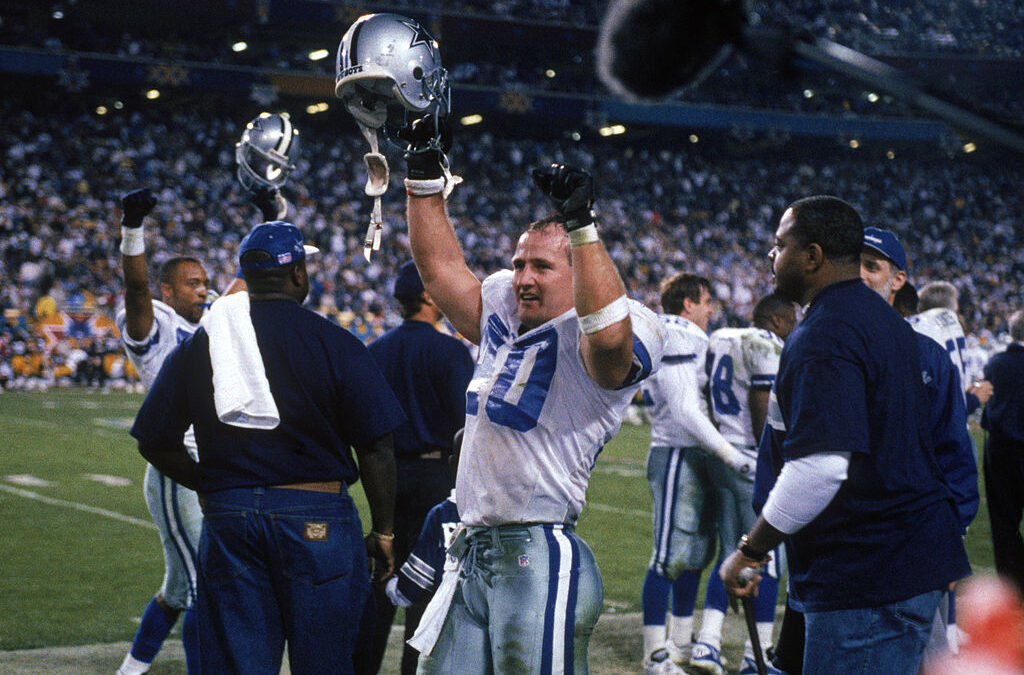
A very competitive game between the Dallas Cowboys and the Pittsburgh Steelers that resulted in the ‘Boys winning, 27-17. Troy Aikman threw a touchdown to Jay Novacek against no interceptions and Emmitt Smith scored two rushing touchdowns. Neil O’Donnell of the Steelers struggled as he threw one touchdown against three interceptions. Cowboys’ cornerback, Larry Brown had two of O’Donnell’s interceptions that earned him Super Bowl MVP. With the win, the Cowboys solidified their dynasty status of the 1990s, with Barry Switzer coaching most of Jimmy Johnson’s players.
Super Bowl XXXI: B+
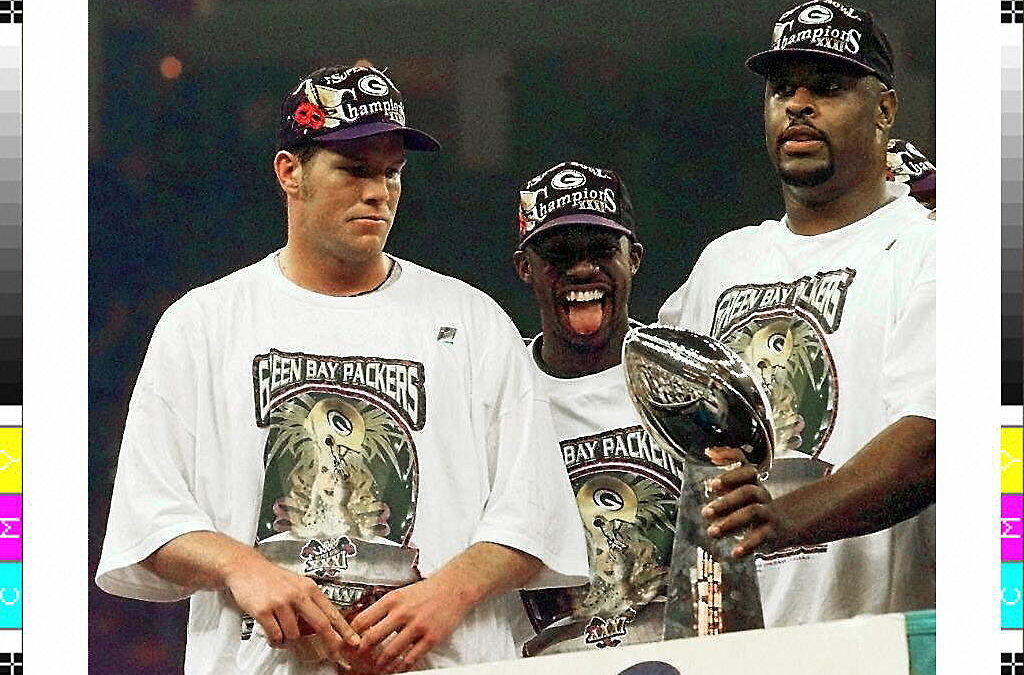
With the Green Bay Packers back in championship contention, Brett Favre and Mike Holgren led the team to a 35-21 victory over Bill Parcells’ New England Patriots. Favre threw two touchdowns against no interceptions (one of those touchdowns was an 81-yard TD to Antonio Freeman). Drew Bledsoe threw two touchdowns against four interceptions while Curtis Martin scored a rushing touchdown. The tide of the game changed when Desmond Howard scored a 99-yard kick-return for a touchdown (he was named Super Bowl MVP as a result). This was Packers first Super Bowl win since Super Bowl II against the Oakland Raiders.
Super Bowl XXXII: A-
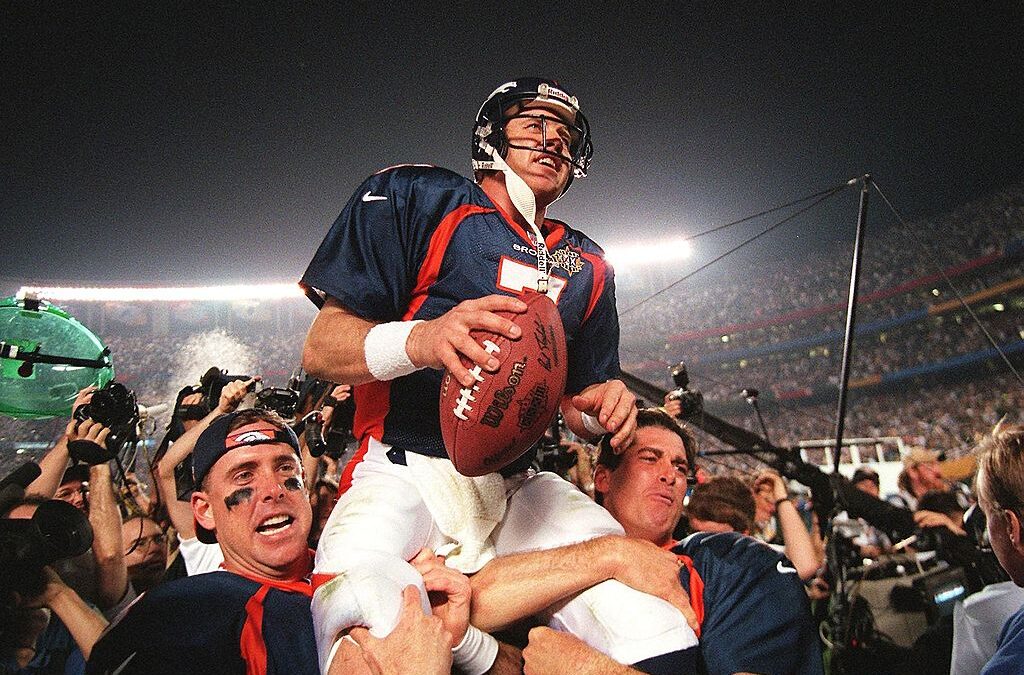
After years of making it to the big dance and losing in heartbreaking or beat-down fashion, John Elway and the Denver Broncos finally emerged as champions, as they defeated Brett Favre and the Green Bay Packers, 31-24. Elway threw an interception, but scored a rushing touchdown while Terrell Davis, who had a migraine headache, scored three rushing touchdowns on 157 yards and was named Super Bowl MVP. Favre threw three touchdowns against an interception (two touchdowns were scored by Antonio Freeman in the effort.) In the end of the day, it was extremely emotional and heartwarming to see John Elway finally become a Super Bowl champion.
Super Bowl XXXIII: B+
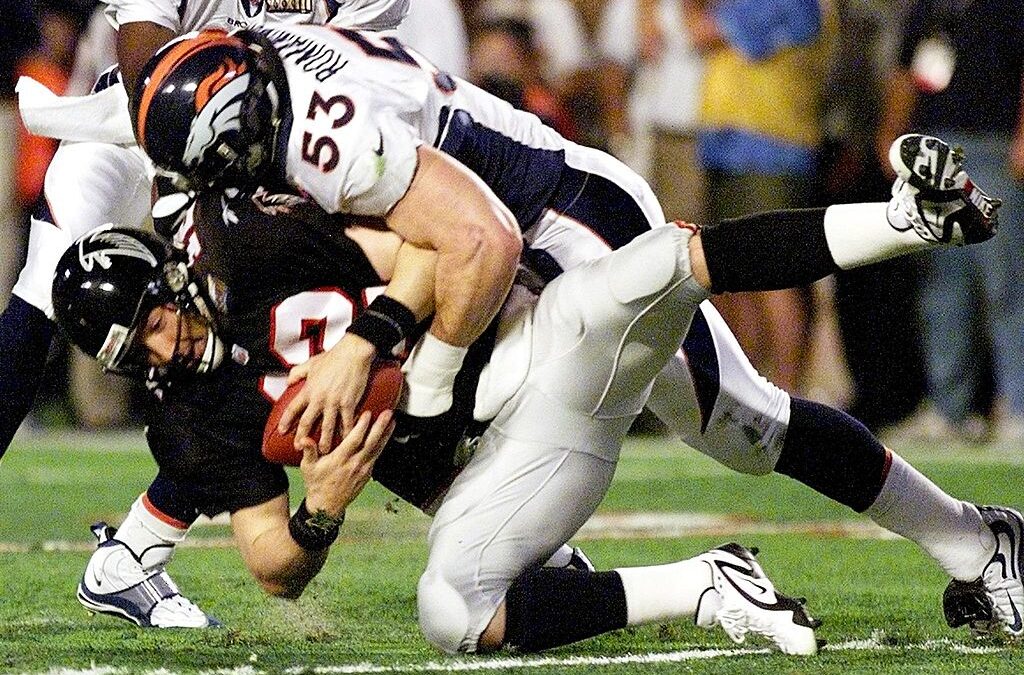
John Elway and the Denver Broncos returned to the big dance and won it all, 34-19 against the Atlanta Falcons, coached by former Broncos head coach, Dan Reeves. Elway threw a touchdown against an interception and scored a rushing touchdown. Chris Chandler of the Falcons threw a touchdown against three interceptions (two of those interceptions were picked by Darien Gordon of the Broncos). When the dust settled, Elway emerged as a champion for the second time in his career, and rode off into the sunset a winner, as he retired from playing football immediately after.
Super Bowl XXXIV: A
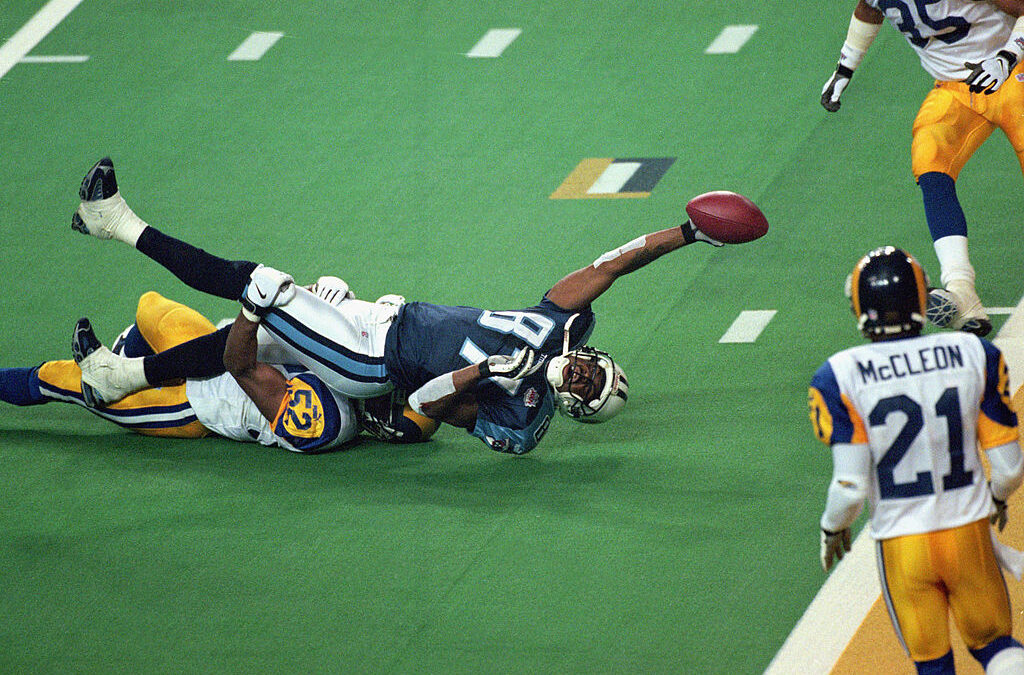
One of the best Super Bowls ever played, the St. Louis Rams led by the “Greatest Show on Turf” played their hearts out in their 23-16 victory over the Tennessee Titans. Kurt Warner, who was a backup quarterback that season, threw for over 414 yards and threw two touchdowns against no interceptions. The late Steve McNair, threw no touchdowns or interceptions in the game. Eddie George scored rushing touchdowns for the Titans. The game is also widely remembered for Rams linebacker, Mike Jones’ tackle on Kevin Dyson, making it one yard short of the end-zone- giving the Rams the win.
Super Bowl XXXV: B-
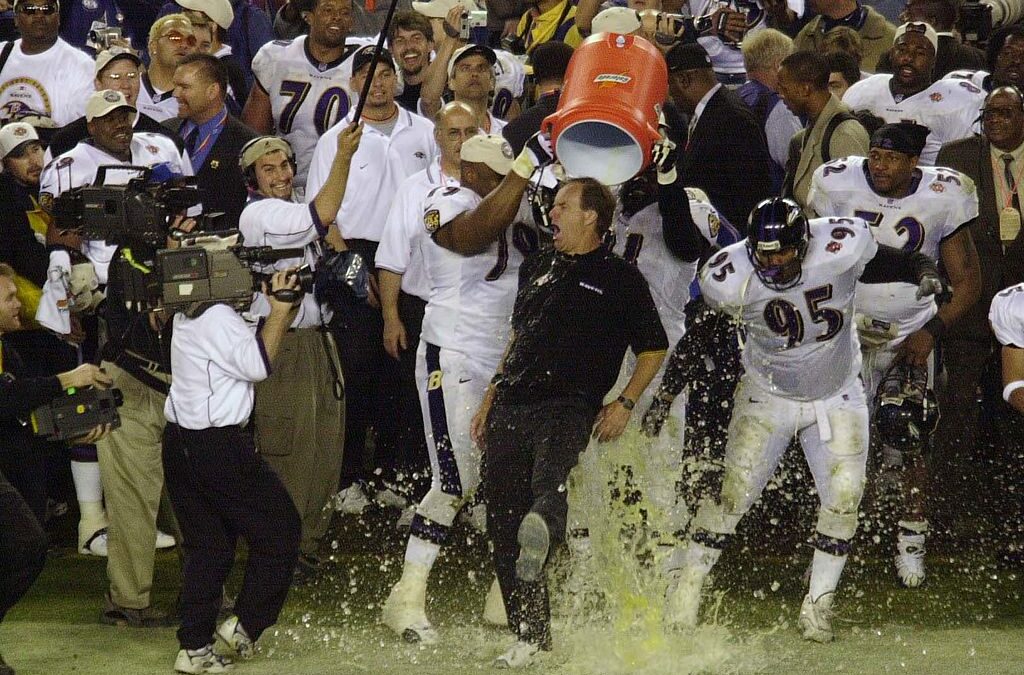
Five seasons after moving from Cleveland to Baltimore, the Ravens clobbered the New York Giants 34-7 in an all-defensive victory. Giants quarterback, Kerry Collins, threw four interceptions on the night. Duane Starks scored a 49-yard pick-six. Jamie Sharper, Chris McAlister, and Kim Herring also had interceptions. Super Bowl MVP, Ray Lewis had four pass deflections and five tackles in Baltimore’s beat down victory.
Super Bowl XXXVI: A
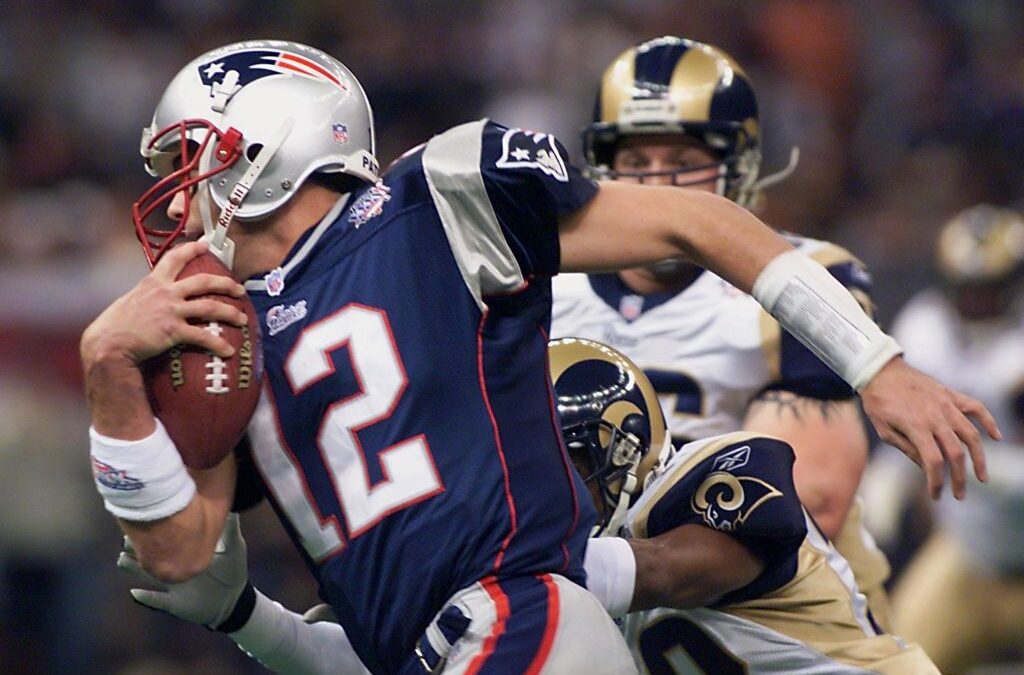
Arguably, one of the greatest Super Bowls ever played. The New England Patriots entered the game as 14 point underdogs, as they stunned the “Greatest Show on Turf” St. Louis Rams, 20-17. This game was also the start of the coaching and quarterback duo of Bill Belichick and Tom Brady, going to their first of nine Super Bowls together. Brady threw one touchdown against no interceptions while Kurt Warner was picked apart by the Patriots’ defense. At the end, Adam Vinatieri kicked the game-winning field goal, as the Patriots begin their winning ways in upset fashion.
Super Bowl XXXVII: C
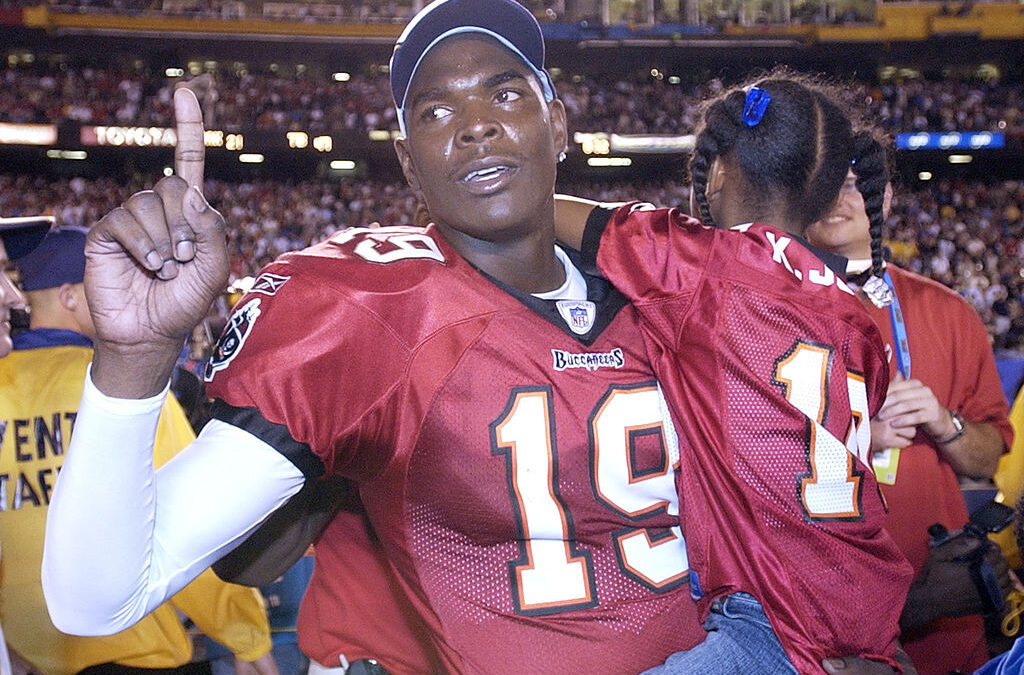
Nicknamed the Gruden Bowl, Super Bowl XXXVII saw Jon Gruden’s Tampa Bay Buccaneers defeat his former team, the Oakland Raiders 48-21. Gruden was traded to the Bucs in the 2002 offseason and knew the Raiders’ weaknesses, making things very painful for the Silver and Black, throughout the game. Rich Gannon threw two touchdowns against five interceptions, as the Bucs defense was relentless. Dwight Smith had two pick-sixes for the Bucs, Super Bowl MVP, Dexter Jackson had two interceptions, and Derrick Brooks had an interception returned for 44 yards. It was true vindication for Gruden, as he defeated the team that traded him away that offseason.
Super Bowl XXXVIII: A-
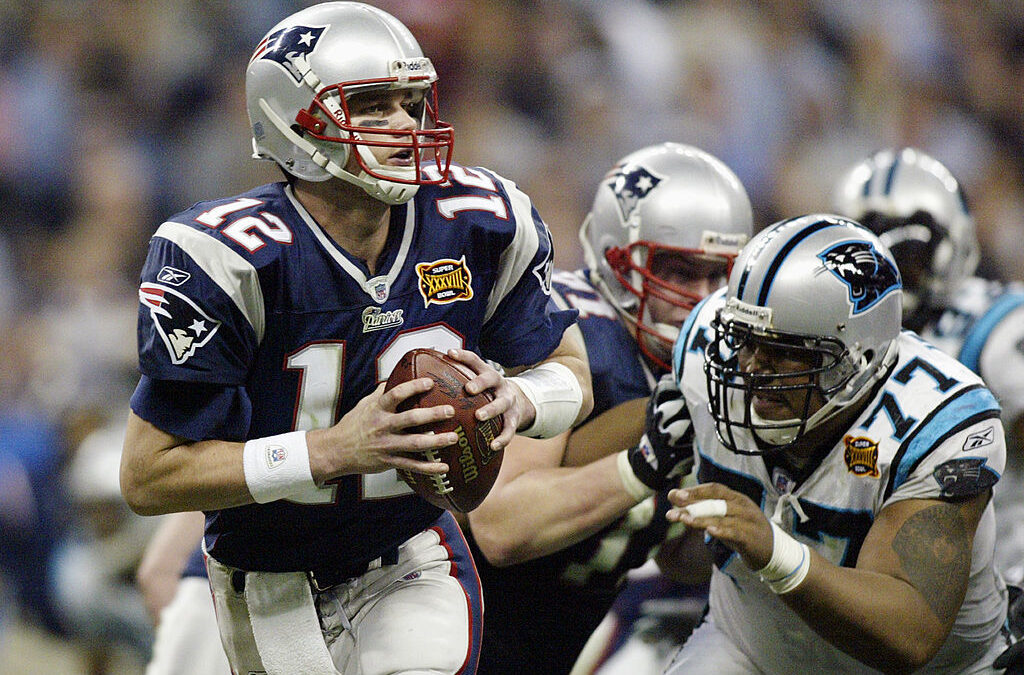
Another thrilling February classic, that had the New England Patriots win in last second fashion, 32-29 against the Carolina Panthers. Both teams did all their scoring in the second and fourth quarters of the game, while they kept each other out of the end-zone in the first and third quarters. Tom Brady threw three touchdowns against one interception while Jake Delhomme threw three touchdowns against no interceptions, but was sacked four times. At the very end of the game, Adam Vinatieri, once again, kicked the game-winning field goal and smothered Rod Smart on the last kick off, sealing the deal for their second Super Bowl victory.
Super Bowl XXXIX: A-
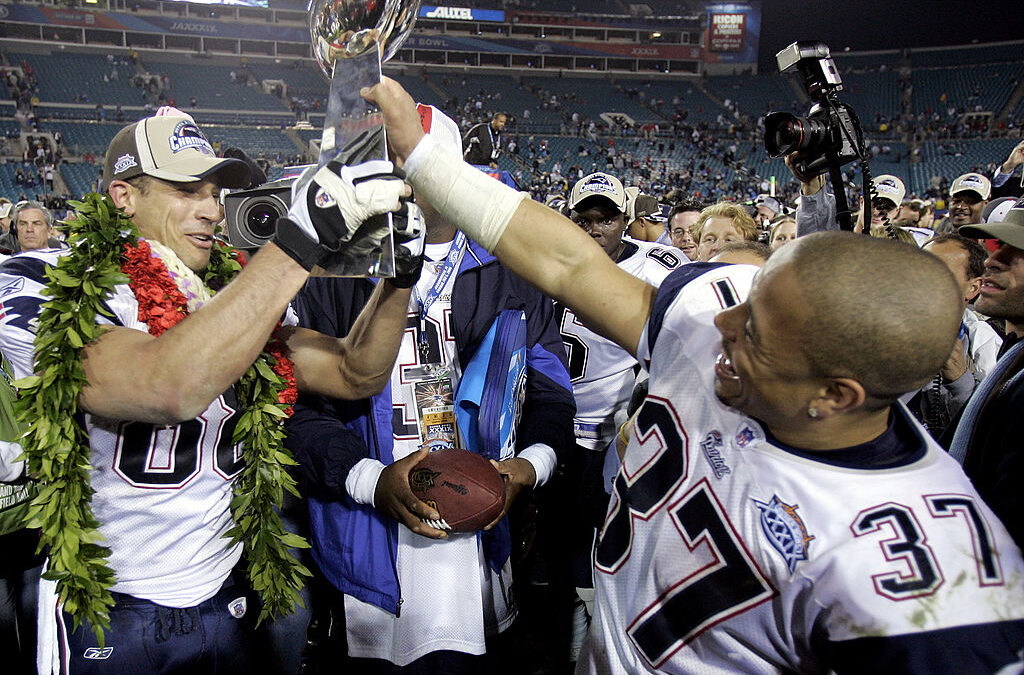
A third classic that saw the New England Patriots defeat the Philadelphia Eagles and become a dynasty in their, 24-21 victory. Tom Brady threw two touchdowns against no interceptions, while Donovan McNabb threw three touchdowns against three interceptions. Terrell Owens of the Eagles, played his heart out, as he defied his doctors and played on an injured ankle. Owens caught nine receptions for 122 yards. Deion Branch of the Patriots caught 11 receptions for 133 yards and was named Super Bowl MVP. If the Eagles somehow won the game, Owens would’ve named Super Bowl MVP for his valiant effort.
Super Bowl XL: C-
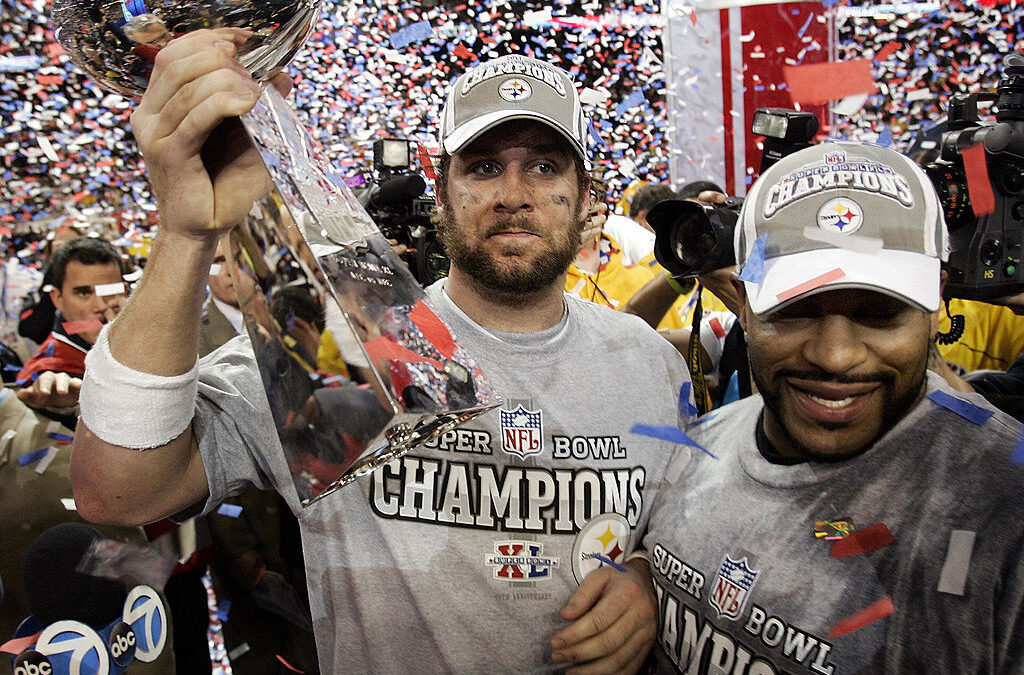
After losing Super Bowl XXX 10 years prior, Bill Cowher finally won it all in a 21-10 controversial Super Bowl XL, against the Seattle Seahawks. Ben Roethlisberger scored a rushing touchdown that looked questionable, while the Seahawks Darrell Jackson looked like he scored a touchdown, but was called for pass interference. Roethlisberger did throw two interceptions in the game, but was bailed out by the strong Steelers’ defense. Antwaan Randle-El threw a touchdown pass to Hines Ward (who was named Super Bowl MVP), as the Steelers emerged victorious, in the end.
Super Bowl XLI: B+
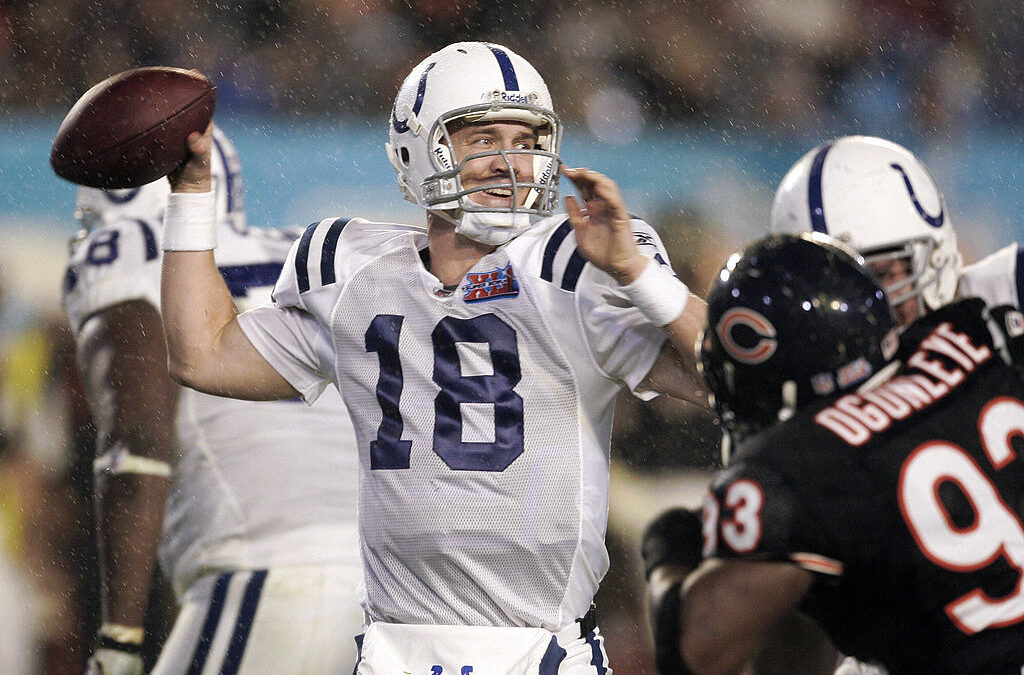
In a very wet and rainy Miami, Peyton Manning, and the Indianapolis Colts, finally earned the elusive Super Bowl victory, in a 29-17 battle with the Chicago Bears. The game started off with a bang, as Devin Hester scored a 92-yard kick return for a touchdown. After being down 14-6 at the end of the first quarter, Manning and the Colts went to work, as they battled the elements and withstood the might of the Bears, to secure the victory. Rex Grossman of the Bears struggled as he threw one touchdown against two interceptions while Manning threw a touchdown against an interception. It was a great Super Bowl victory for Manning.
Super Bowl XLII: A
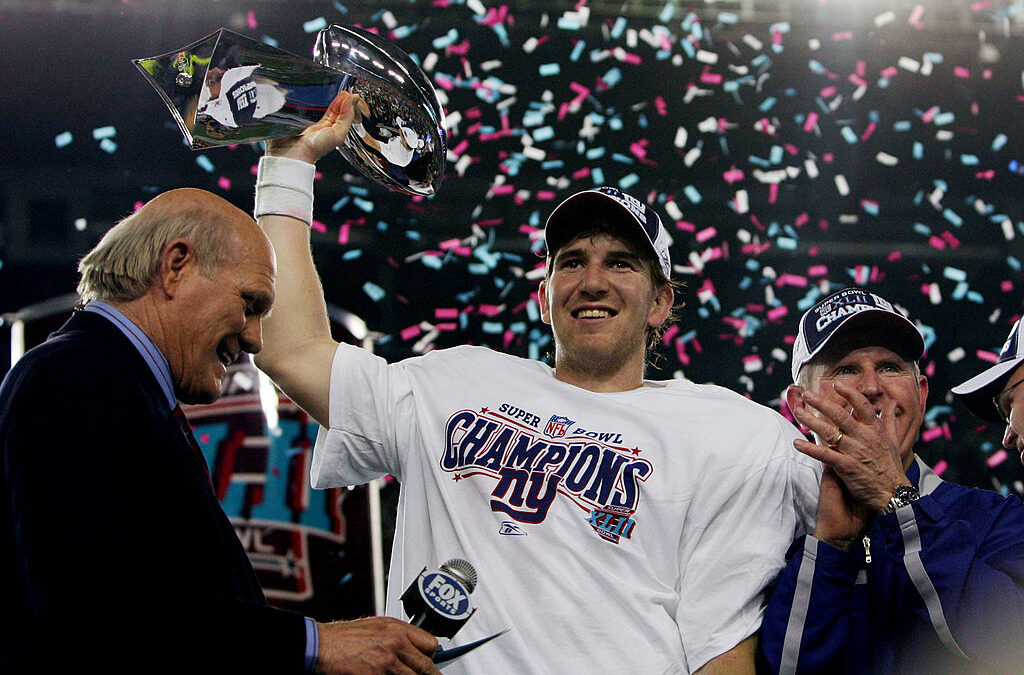
Six seasons after being underdogs, the undefeated New England Patriots came into Super Bowl 42 as 12 point favorites. However, they ended losing 17-14 in giant upset fashion to the New York Giants. Tom Brady threw a touchdown to Randy Moss against no interceptions, but was sacked three times. Eli Manning threw two touchdowns against one interception. The game is truly remembered, for Manning throwing the throw of his life to David Tyree, who caught the ball with his helmet. It eventually set the game winning touchdown to Plaxico Burress. At the end, Manning and the Giants became Super Bowl heroes to everyone in the New York Metropolitan area, as if they were David conquering Goliath.
Super Bowl XLIII: A-
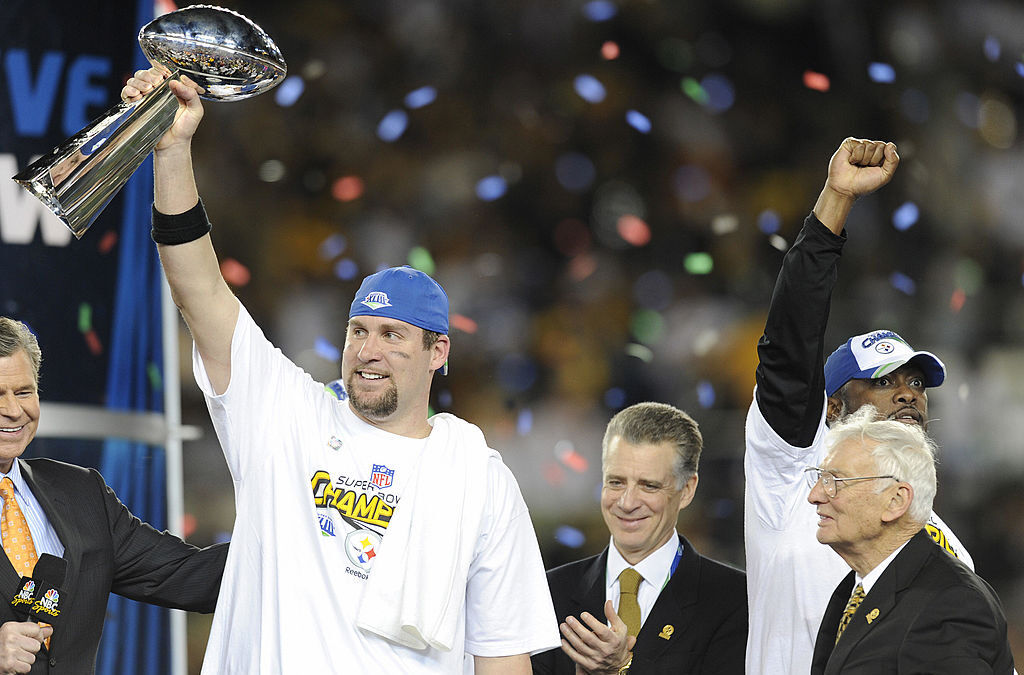
Another iconic February classic, as the Pittsburgh Steelers defeated the underdog, Arizona Cardinals 27-23. Ben Roethlisberger played alright, as he threw a touchdown against an interception, while Kurt Warner threw three touchdowns against an interception that turned into a 100-yard pick-six from James Harrison, to close out the first half. Despite everything Warner was able to do for the Cardinals, Roethlisberger connected with Santonio Holmes near the very end of the game, and won it all for Pittsburgh, giving the Steel City their sixth Super Bowl. A lot of people were pulling for the underdog Cardinals, for making their first and only Super Bowl.
Super Bowl XLIV: B+
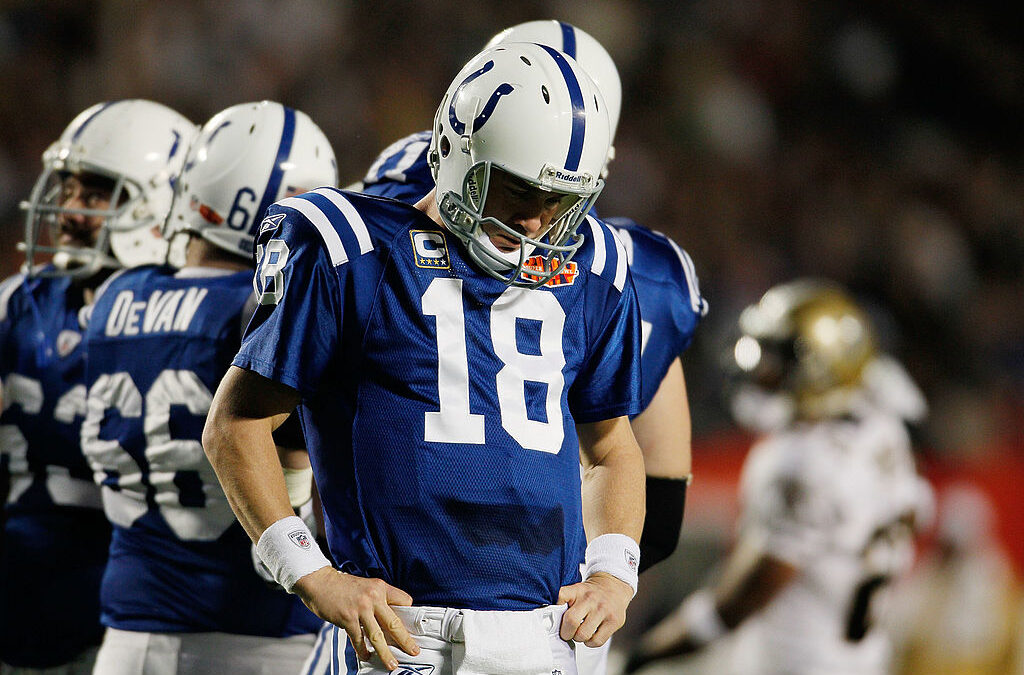
If you needed to root for an entire city, Super Bowl XLIV was your game, as the New Orleans Saints defeated Peyton Manning and the Indianapolis Colts 31-17 bringing the Lombardi Trophy to the Big Easy, four years after Hurricane Katrina struck New Orleans. Drew Brees threw two touchdowns against no interceptions while Peyton Manning threw a touchdown to Pierre Garcon and an interception to Tracy Porter, who returned it for a 74-yard pick six. Super Bowl XLIV goes down as one of the most uplifting Super Bowls, as the citizens of New Orleans partied on the streets in style and marked a great cities official comeback.
Super Bowl XLV: B+
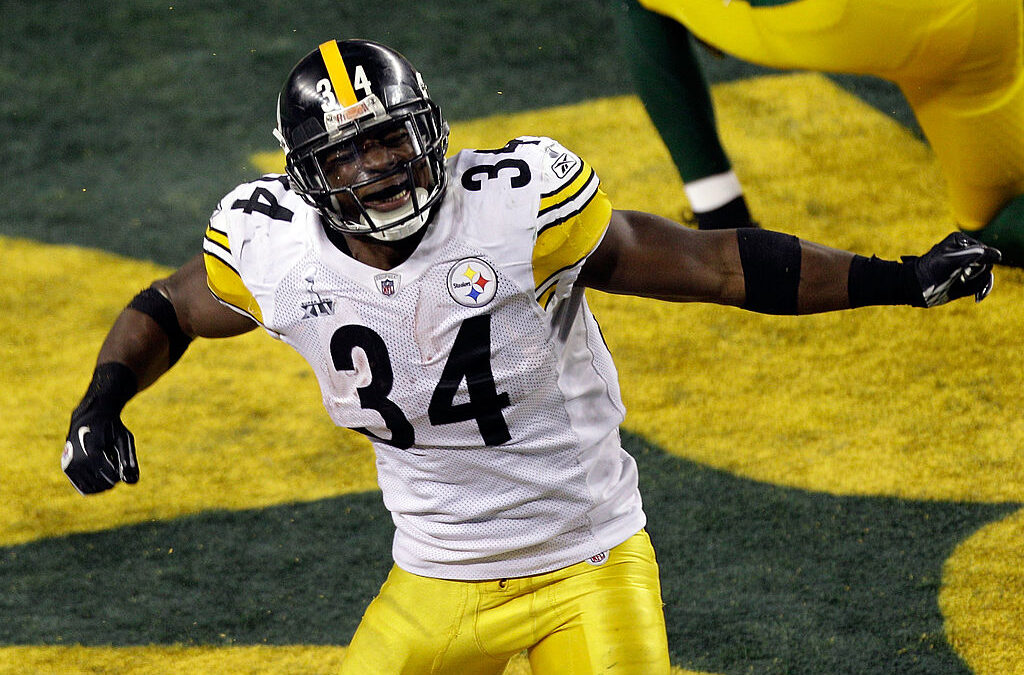
After moving on from Brett Favre, Aaron Rodgers led the Packers to their fourth Super Bowl championship, as a wildcard team in their 31-25 victory over the Pittsburgh Steelers. Rodgers threw three touchdowns against no interceptions while Ben Roethlisberger threw two touchdowns against two interceptions. This game also marked the first time both of these historic franchises met in the Super Bowl, with the Packers emerging on top, as the superior of the two. It also marked the last time a wildcard team made it in and won the Super Bowl- until Super Bowl LV.
Super Bowl XLVI: A-
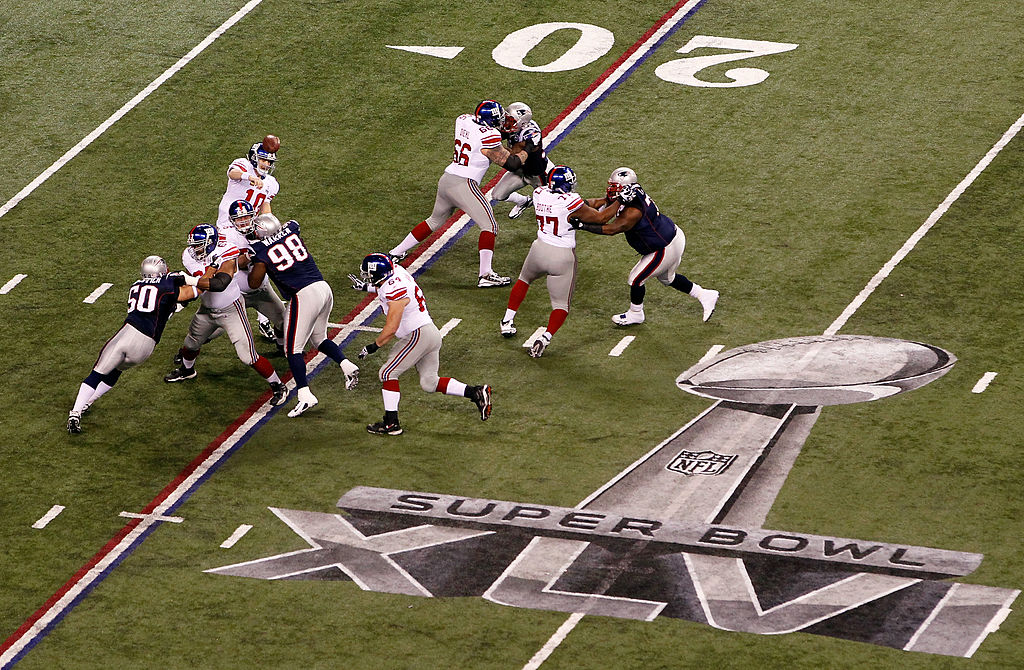
In a thrilling rematch of Super Bowl XLII, the New York Giants once again defeated the New England Patriots, 21-17. Eli Manning threw a touchdown to Victor Cruz against no interceptions, while Tom Brady threw two touchdowns against one interception. The Patriots entered the game as three point favorites, had dual threatening tight ends in Rob Gronkowski and Aaron Hernandez, and came up short, at very end of the game, on a failed comeback attempt.
Super Bowl XLVII: A
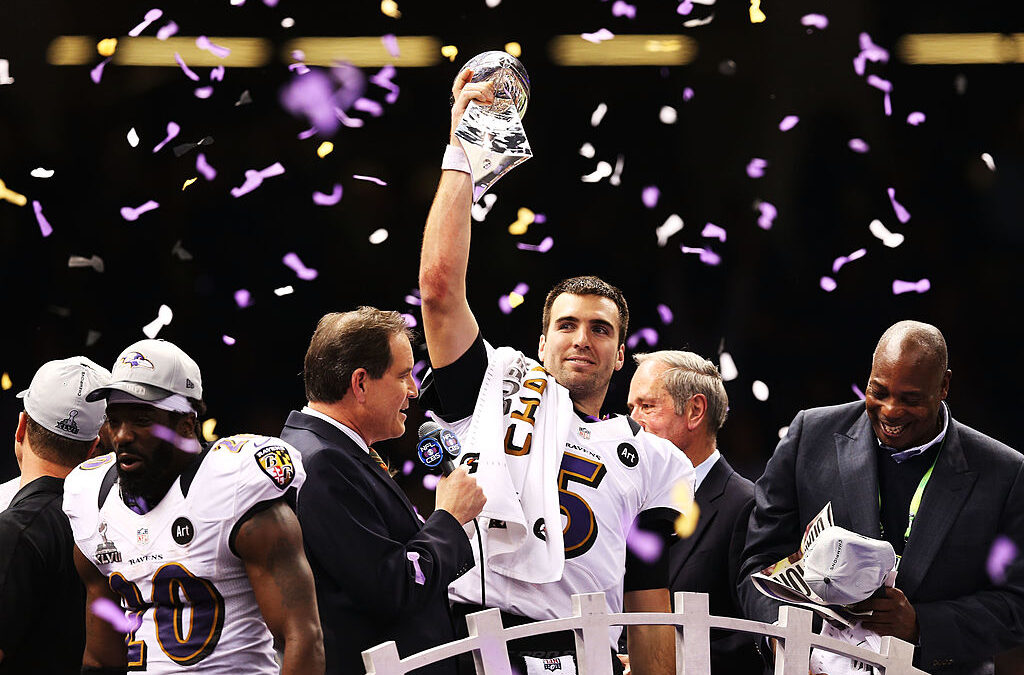
Nicknamed the “Har Bowl”, the Baltimore Ravens, coached by John Harbaugh, squared off against the San Francisco 49ers, coached by Jim Harbaugh, and won against his younger brother Jim, 34-31. Joe Flacco played a great game, as he threw three touchdowns against no interceptions, while Colin Kaepernick threw a touchdown against an interception and scored a rushing touchdown. The Ravens’ defense had three sacks and an Ed Reed interception. At the end of the night, the Ravens gave longtime linebacker, Ray Lewis, another Super Bowl ring, as he retired and rode off into the sunset immediately after.
Super Bowl XLVIII: D
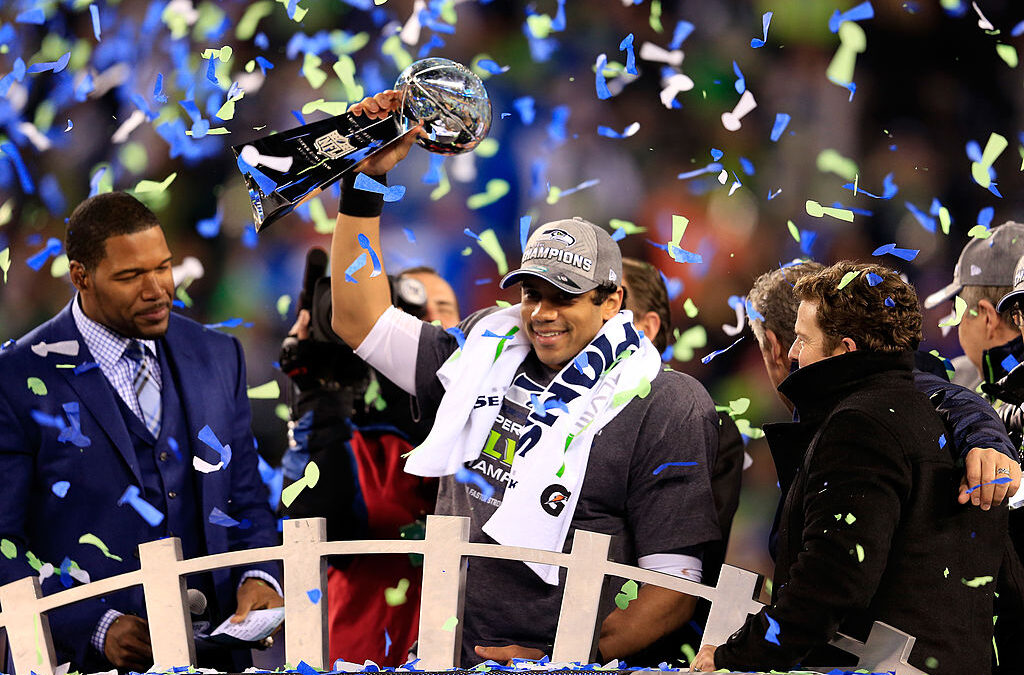
This Super bowl was originally hyped as the game that featured the NFL’s best offense (Denver Broncos) vs the league’s best defense (Seattle Seahawks) in what many thought would be an absolute classic. Instead, what viewers got was a 43-8 blowout victory for the “Legion of Boom” Seattle Seahawks. During the first play of the game, Peyton Manning and the Broncos gave up a safety and never recovered. The Seahawks were way too quick and shut down the Broncos elite offense, in a very boring blowout.
Super Bowl XLIX: A-
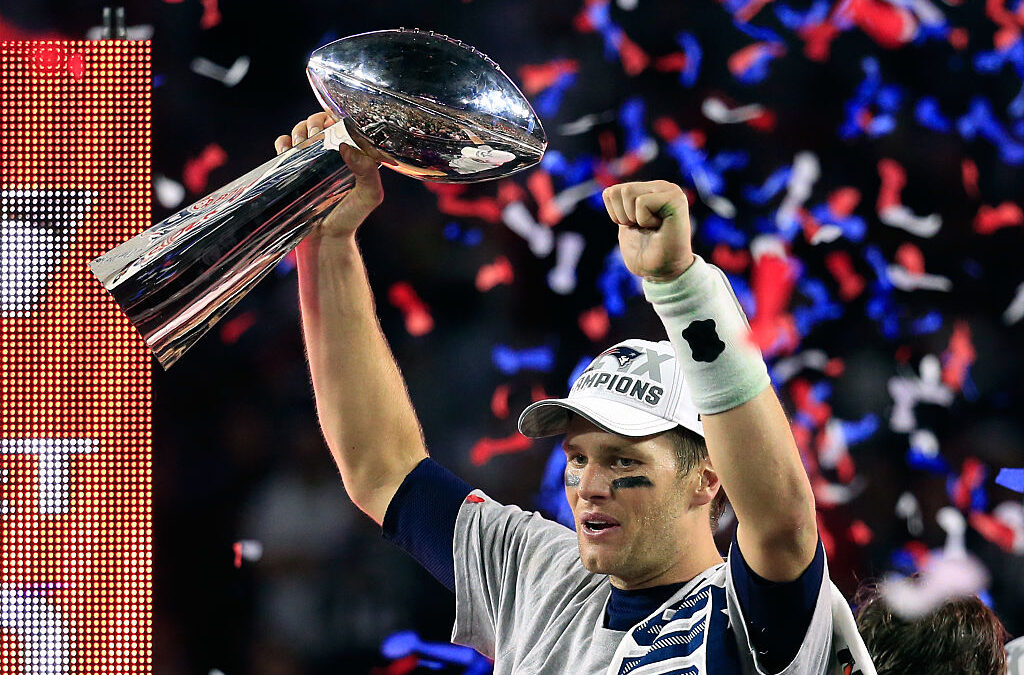
After two giant losses to the New York Giants, the New England Patriots finally re-emerged as Super Bowl champions, as they defeated the Seattle Seahawks, 28-24. Tom Brady threw four touchdowns against two interceptions, while Russell Wilson threw two touchdowns and threw the game-ending interception to Malcolm Butler- instead of handing the ball off to Marshawn Lynch. The Patriots’ defense had three sacks on the night, as they kept the game very close and very competitive with the young Seahawks squad. In the end, the Patriots added another trophy to their dynasty.
Super Bowl 50: C-
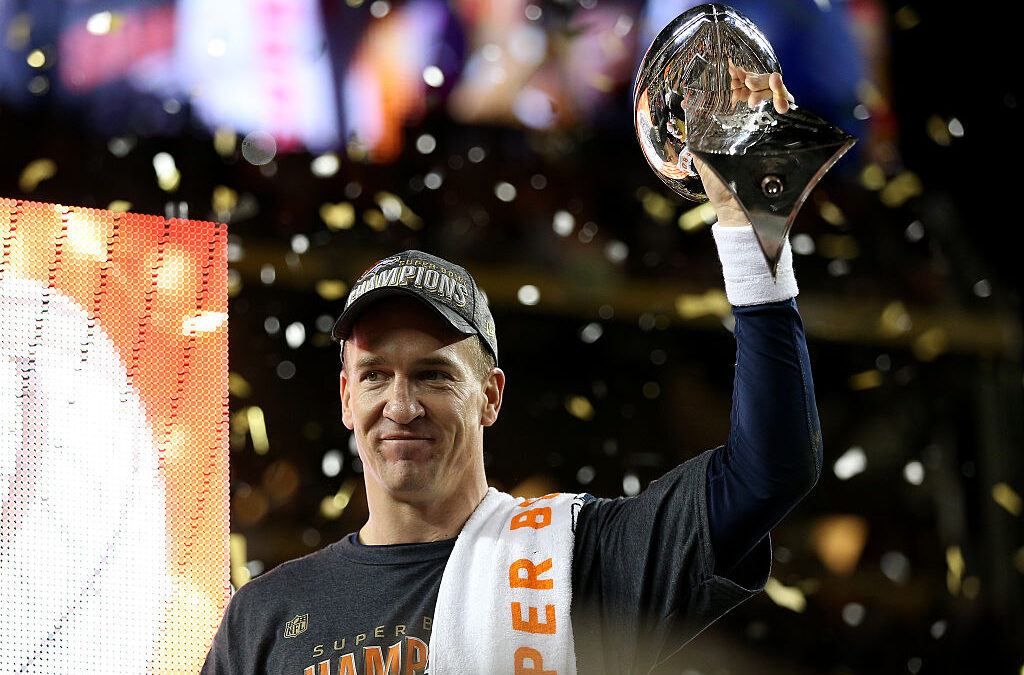
In a somewhat low scoring affair, the Denver Broncos, led by the “No Fly Zone” defense, defeated the Carolina Panthers 24-10. Peyton Manning was way out of his prime, as he threw no touchdowns against one interception and was sacked five times. However, the “No Fly Zone” defense had seven sacks (six against Cam Newton and one against Ted Ginn Jr.), four fumble recoveries, and an interception from T.J. Ward. The Broncos sent Peyton Manning out as a champion, as he retired immediately after the game.
Super Bowl LI: A
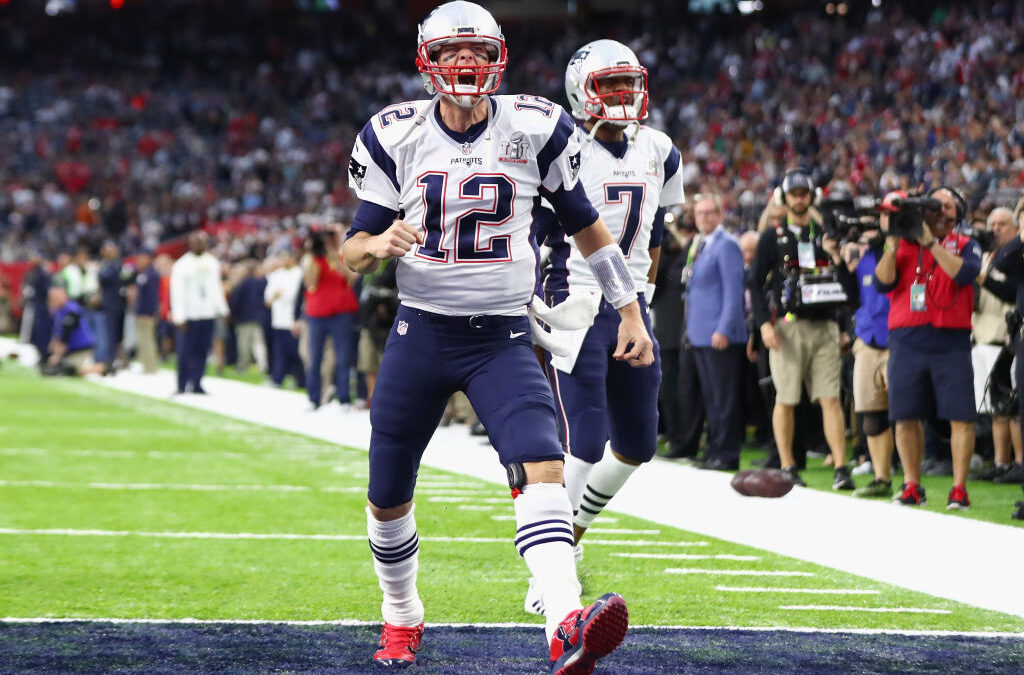
Arguably, one of the great comebacks of all time, the New England Patriots, who were down 28-3, came back and took advantage of an Atlanta Falcons collapse and won 34-28 in overtime. Tom Brady threw two touchdowns against one interception and was sacked five times. Matt Ryan threw two touchdowns against no interceptions, as the Falcons thought they had the lead under control, entering the third quarter. Unfortunately for them, Brady and Bill Belichick picked them apart, to the point the Falcons’ offense couldn’t even get into the end-zone by the fourth quarter. Running back James White scored the game-ending touchdown, as well as another rushing touchdown and a receiving touchdown, as the Patriots earned their fifth Super Bowl.
Super Bowl LII: A
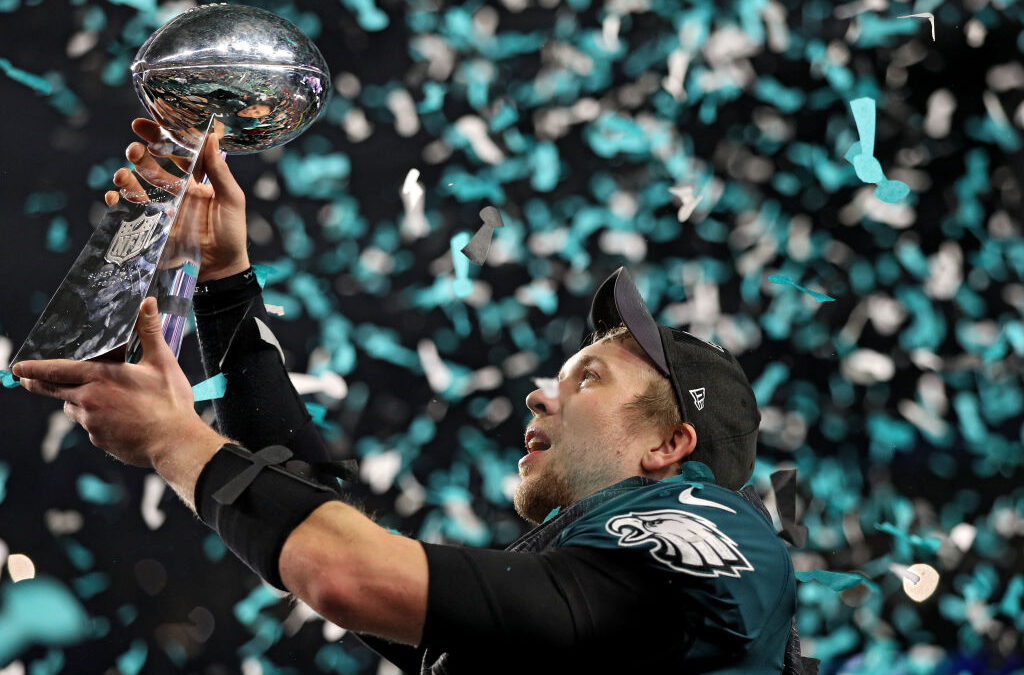
The New England Patriots returned to the big dance, as defending Super Bowl 51 champions, thinking no one could defeat them. They were mistaken, as the Philadelphia Eagles defeated them, 41-33 in an instant thriller of a classic. Tom Brady played one of the best games of his career, as a Patriot with 505 passing yards and three touchdowns. Backup quarterback Nick Foles of the Eagles, threw three touchdowns against an interception. Foles also caught one of the most iconic touchdown passes nicknamed “the Philly Special” from Trey Burton which goes down as one of the best trick plays ever made. Foles became the first backup quarterback to win the Super Bowl since Tom Brady did it back in 2001 against the St. Louis Rams.
Super Bowl LIII: D-
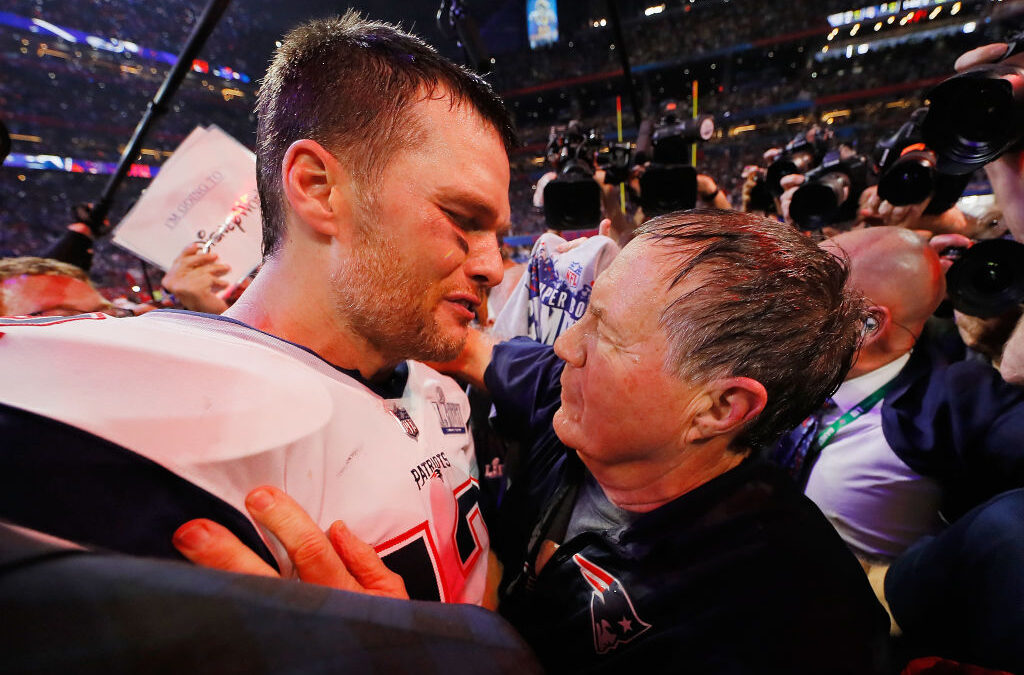
The New England Patriots and Los Angeles Rams clashed in a very boring, low offensive production, and decent defensive battle, in what was a very boring, 13-3 victory for New England. Tom Brady threw no touchdowns against one interception, while Jared Goff threw an interception to Stephon Gilmore in the fourth quarter. Patriots’ running back, Sony Michel scored the only touchdown of the game, in the fourth quarter. Dont’a Hightower had two sacks, Kyle Van Noy and Jonathan Jones each had a sack. It was a very dull battle, as the Patriots super dynasty earned their sixth Super Bowl championship, in arguably one of the worst Super Bowls of all time.
Super Bowl LIV: A-
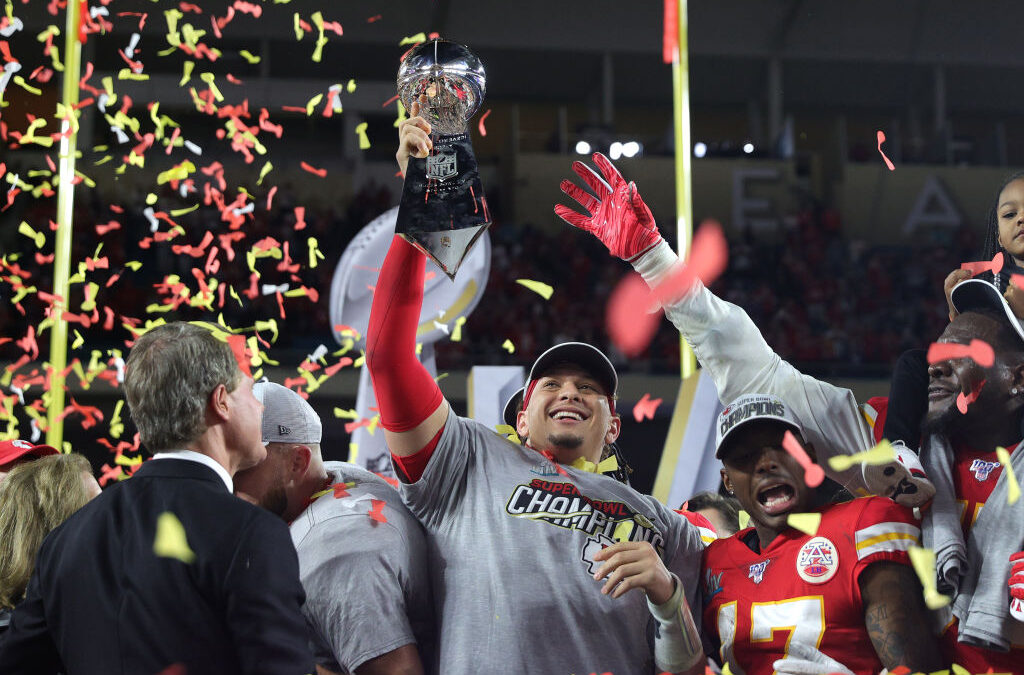
Upcoming newcomer, Patrick Mahomes, and the Kansas City Chiefs, coached by Andy Reid, knockout the San Francisco 49ers 31-20 earning the team its second Super Bowl title since Super Bowl IV. Mahomes threw two touchdowns against two interceptions and scored a rushing touchdown. Former Patriots backup quarterback, Jimmy Garoppolo threw a touchdown against two interceptions. After being down by 10 entering the fourth quarter, Mahomes and the Chiefs scored 21 unanswered points and kept the 49ers out of the end-zone, all quarter long, and emerged as champions.
Super Bowl LV: C
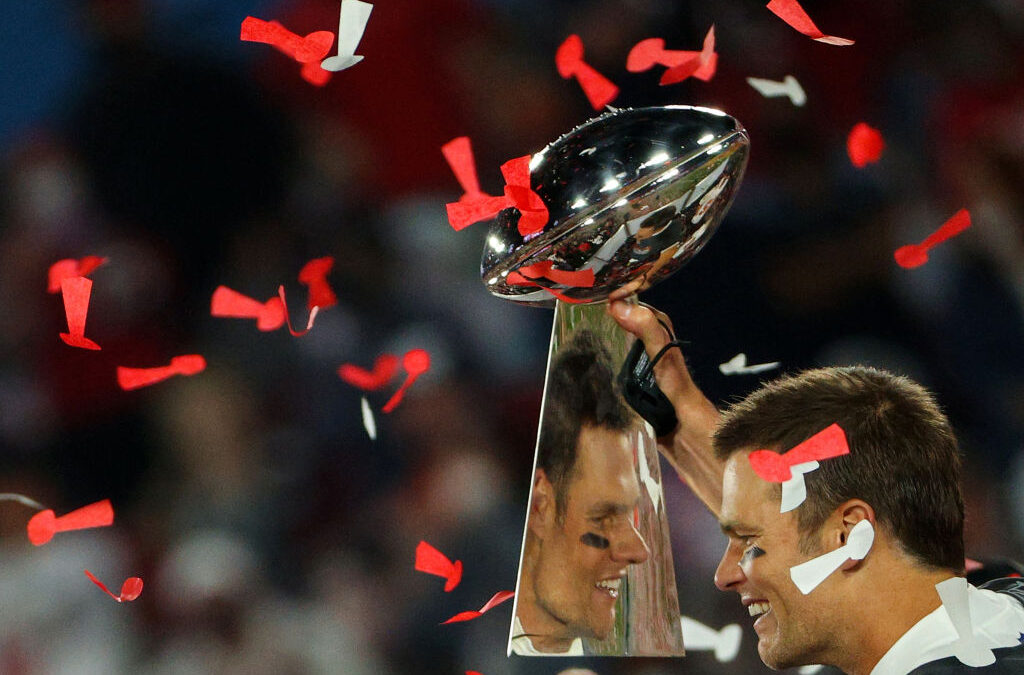
This game was one-sided contest between Tom Brady’s new team, the Tampa Bay Buccaneers, as they won, 31-9 against Patrick Mahomes and the Kansas City Chiefs. Tom Brady threw two touchdowns to Rob Gronkowski and another touchdown to Antonio Brown, while Mahomes threw two interceptions and the Chiefs’ only scored three field goals. It was impressive seeing Tom Brady become, arguably, the greatest quarterback, period, with his seventh Super Bowl win, and doing it without Bill Belichick at his side. It was also Bruce Arians’ first Super Bowl win as a head coach.
Super Bowl LVI: B+
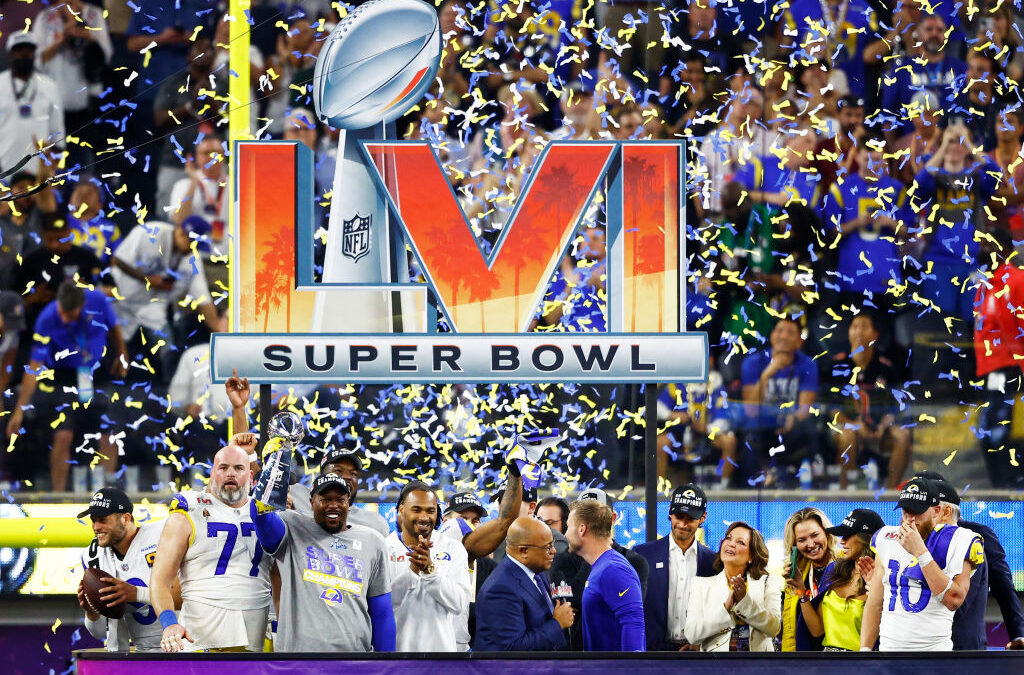
The Los Angeles Rams, led by former Detroit Lions quarterback Matthew Stafford, played a very close neck-and-neck battle with Joe Burrow and the Cincinnati Bengals, and won 23-20. Stafford threw three touchdowns against three interceptions while Burrow threw a touchdown to Tee Higgins against no interceptions. The game is also remembered for Cooper Kupp’s MVP performance and burning Bengals cornerback, Eli Apple, in coverage. The game gave Stafford his first championship, after all he was able to do with the Lions.
Super Bowl LVII: A+
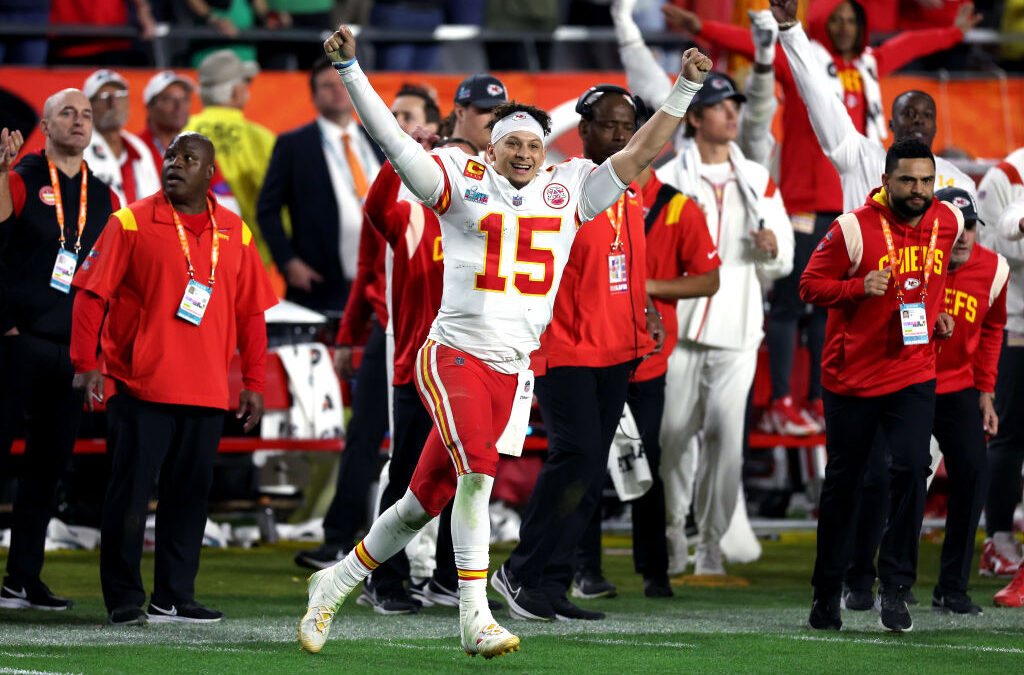
Patrick Mahomes and the Kansas City Chiefs returned to the big dance, and won a very close 38-35 neck-and-neck battle to Jalen Hurts and the Philadelphia Eagles. Mahomes threw three touchdowns against no interceptions and wasn’t sacked at all. Hurts threw a touchdown and wasn’t sacked either. Both Eagles and Chiefs played some of the best offensive football of their lives. In the end, Harrison Butker kicked the game-winning field goal, putting an end to an instant classic.
Super Bowl LVIII: A-
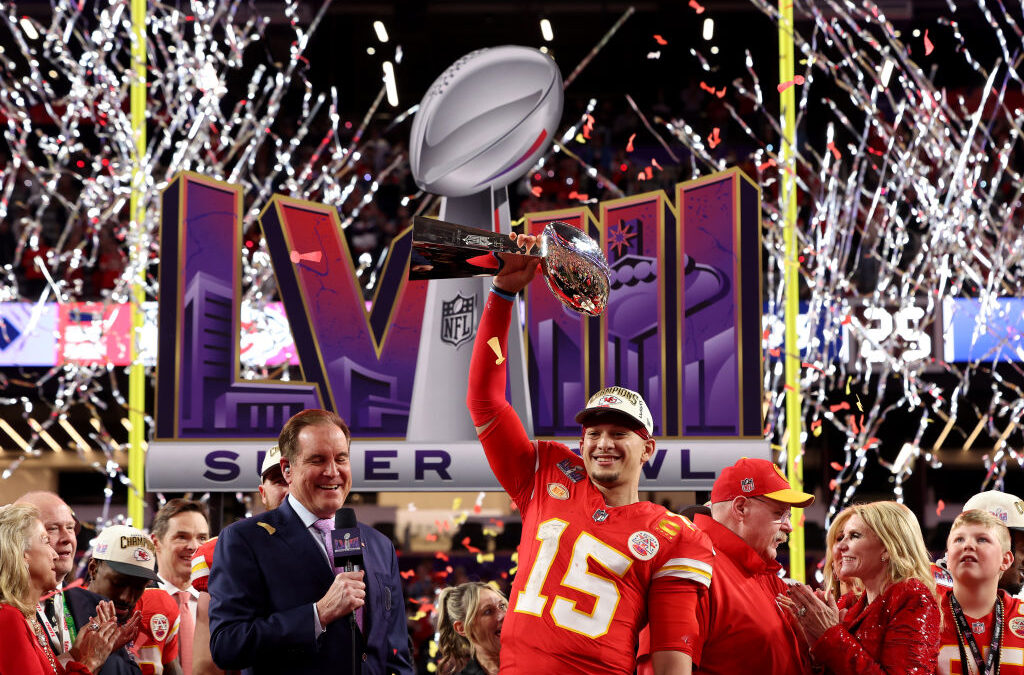
Patrick Mahomes and the Kansas City Chiefs closed out the 2023 season champions in a 25-22 overtime win against the San Francisco 49ers, making the Chiefs a dynasty. Mahomes threw two touchdowns against an interception. 49ers quarterback, Brock Purdy, threw a touchdown against no interceptions. Christian McCaffrey played an outstanding game, with 80 rushing yards, 80 receiving yards, and a receiving touchdown. Mahomes found Marquez Valdes-Scantling for a touchdown and Mecole Hardman for the game-ending touchdown. With the Chiefs declaring the new dynasty, this is possibly the beginning of many other championships to come…


